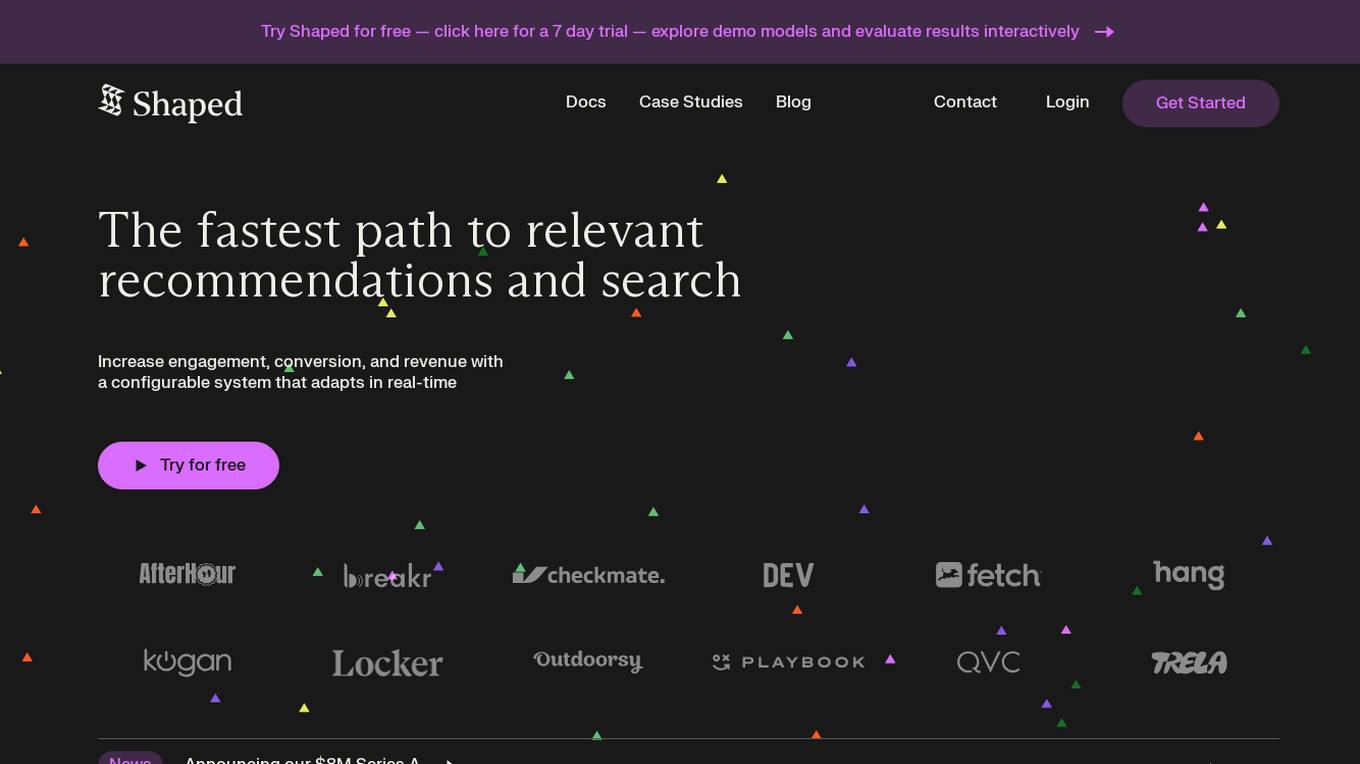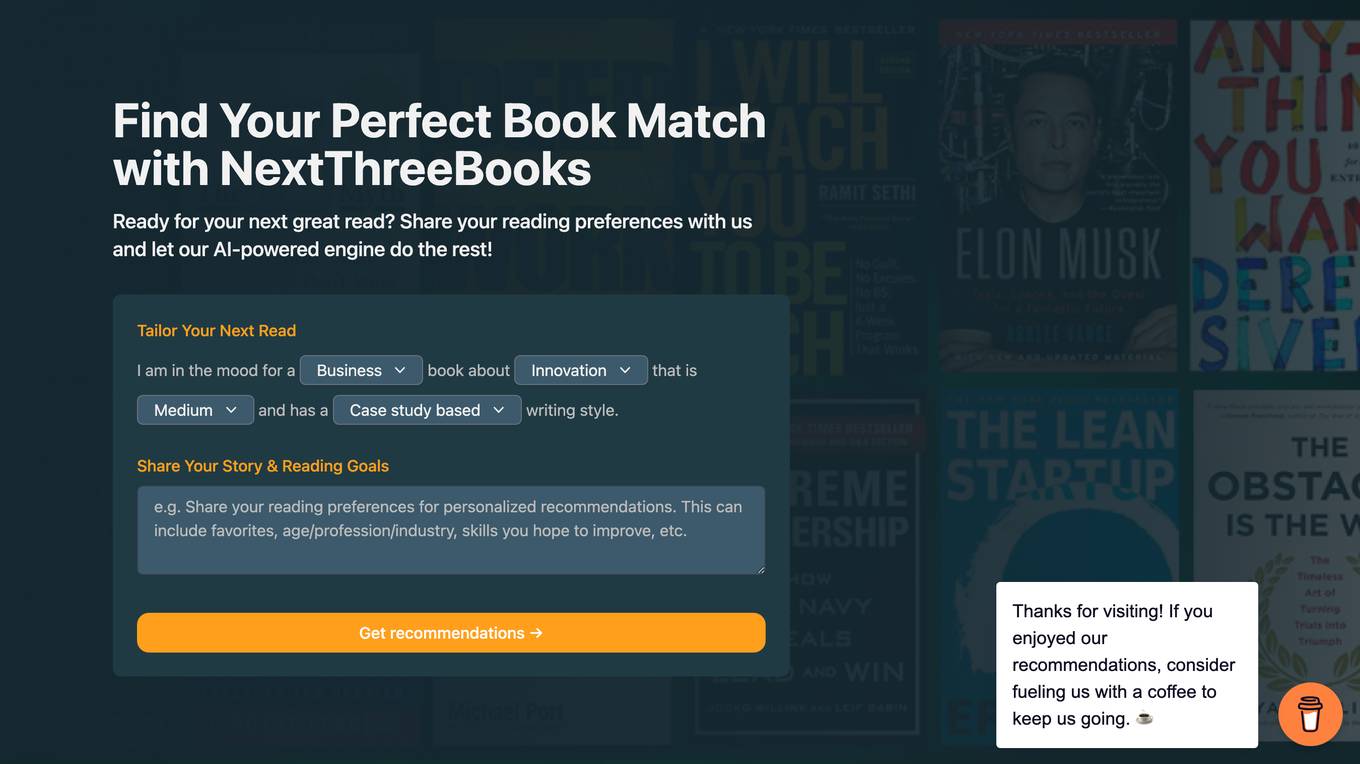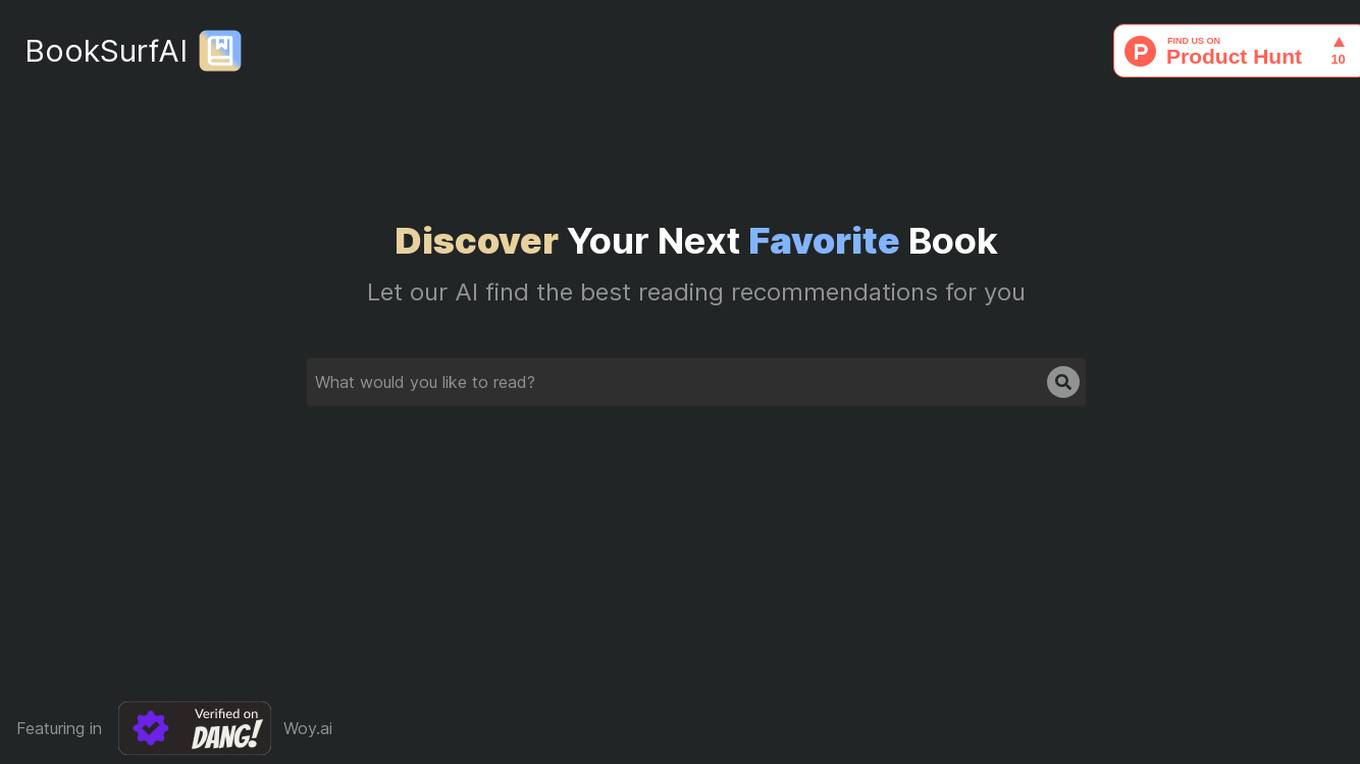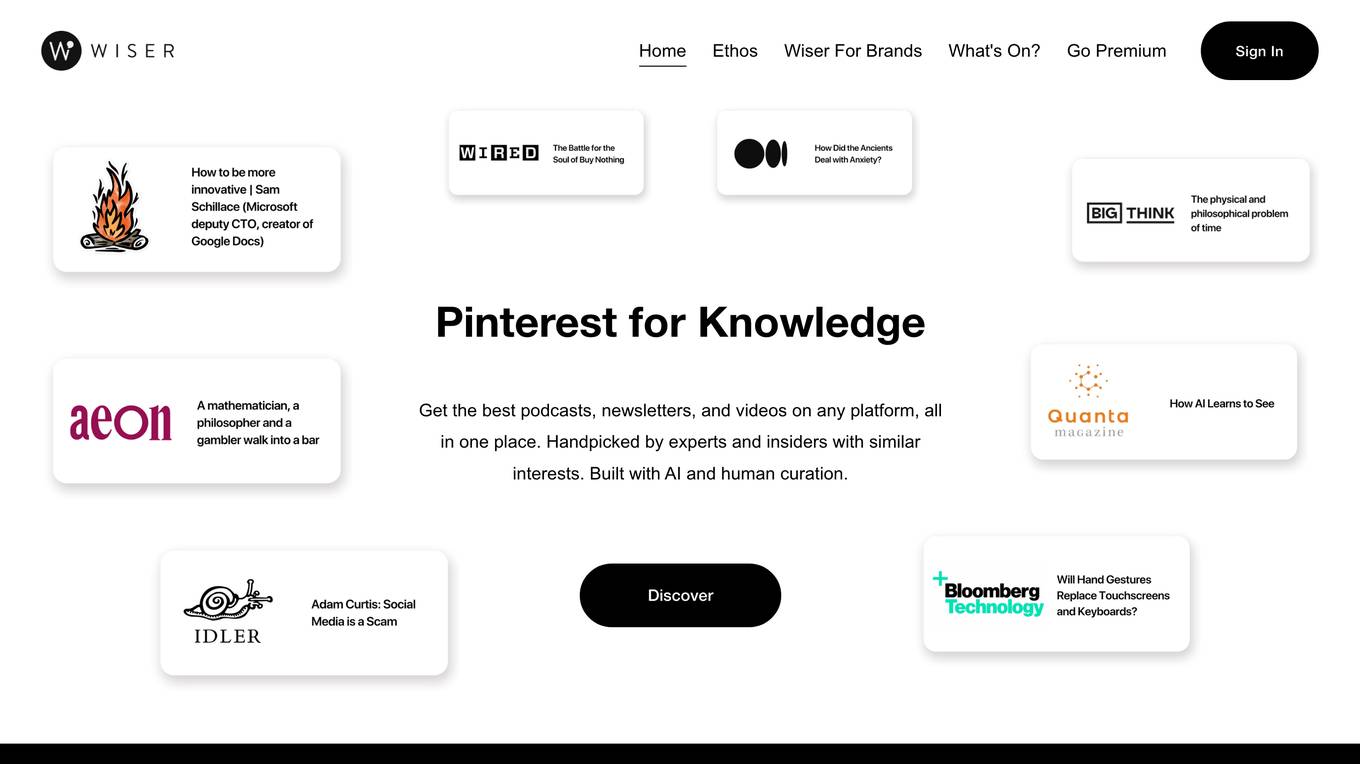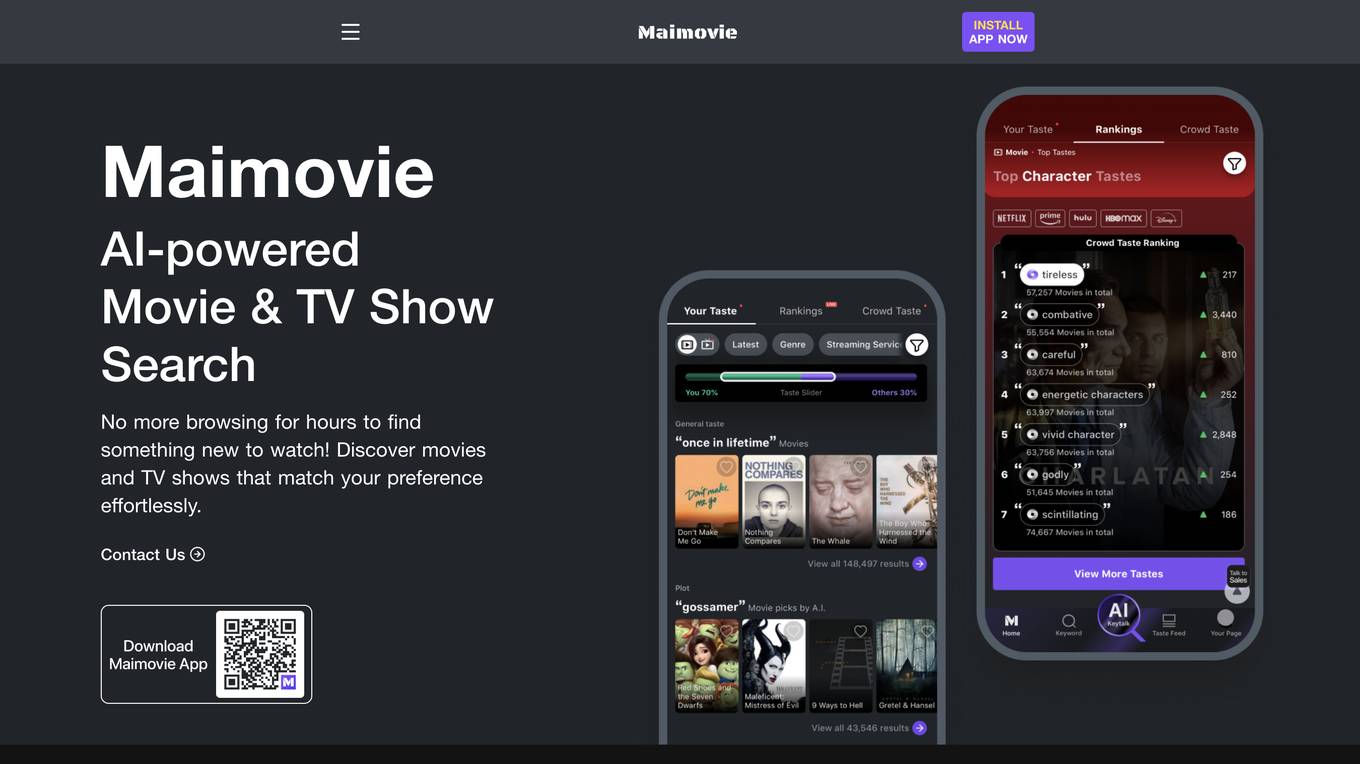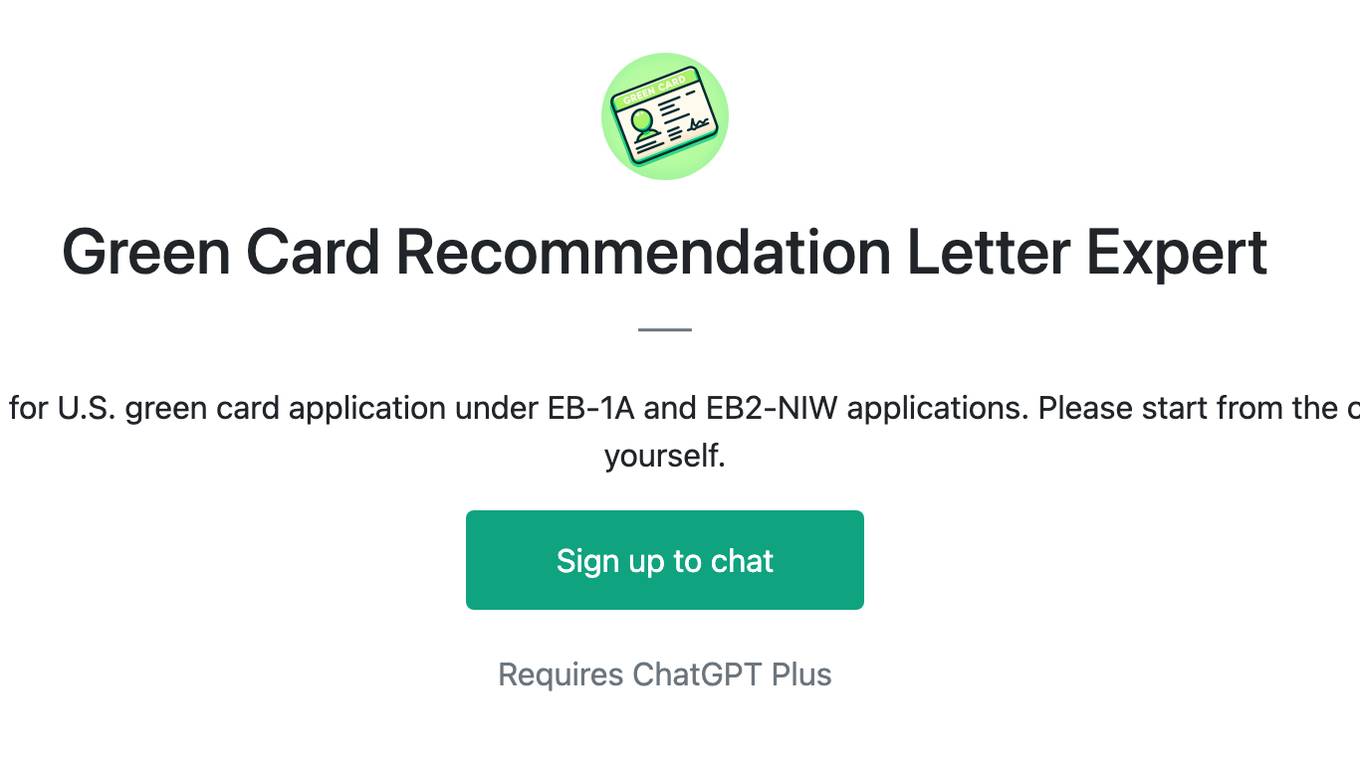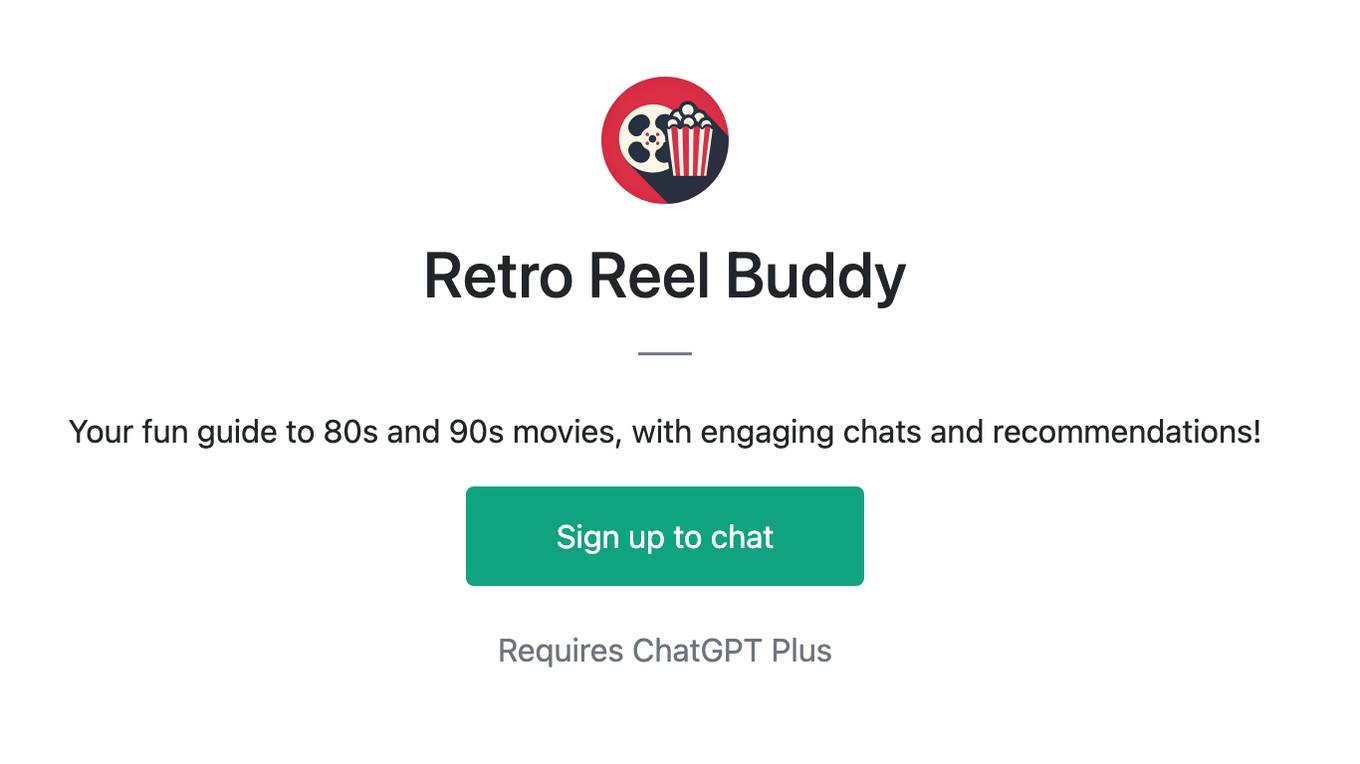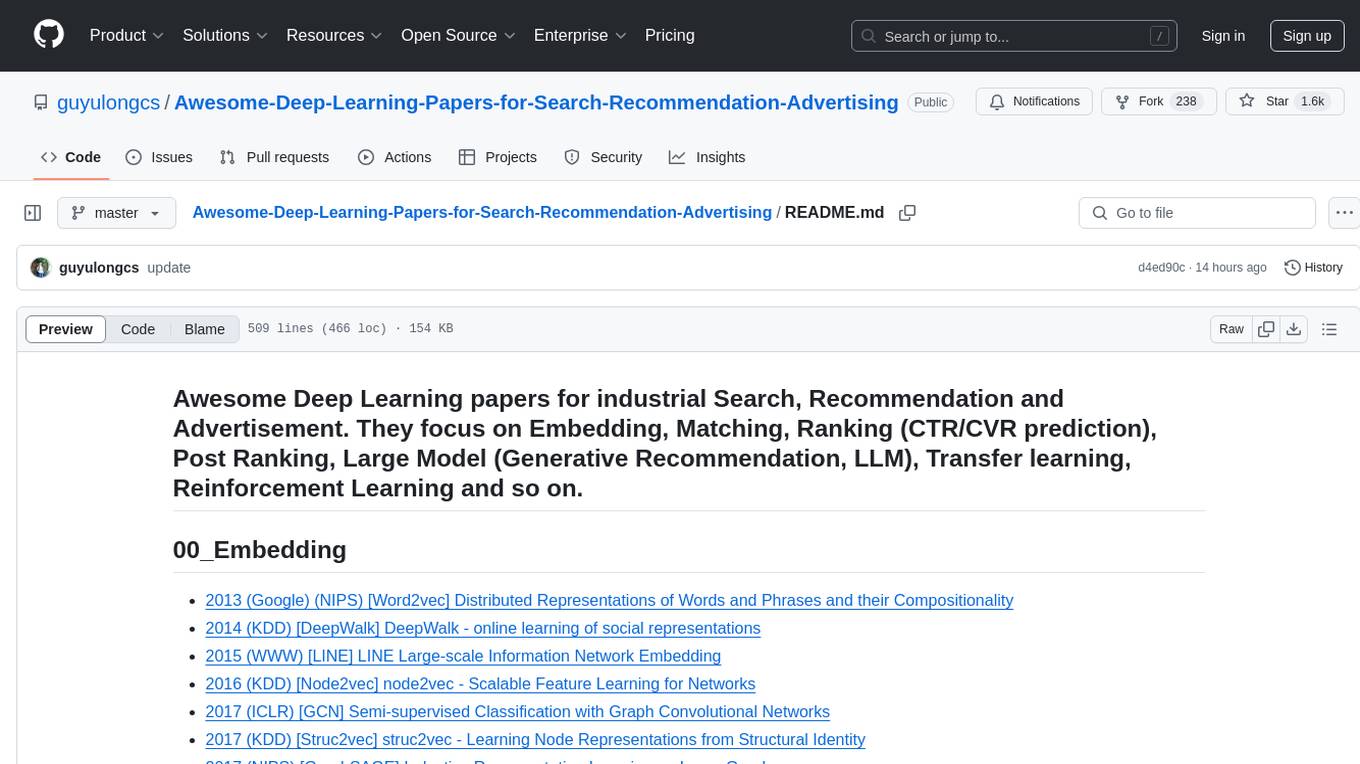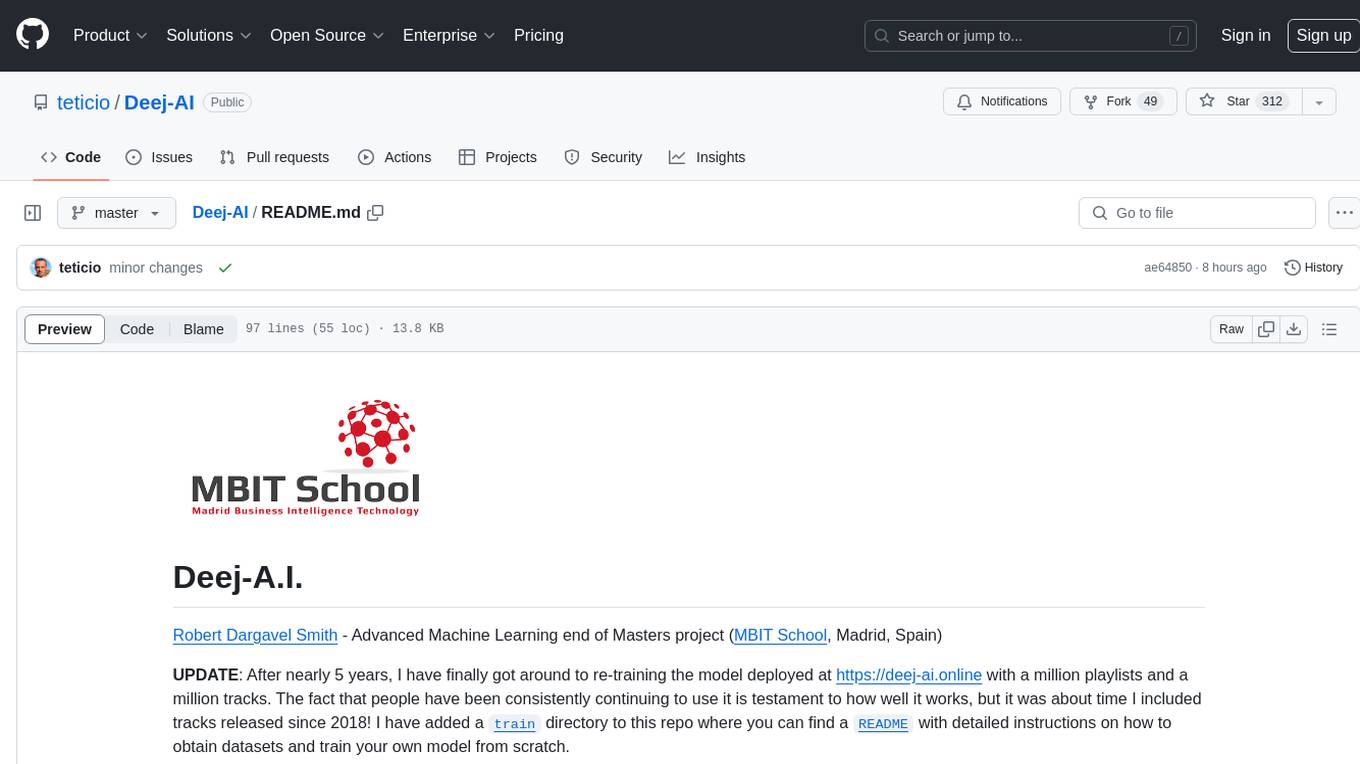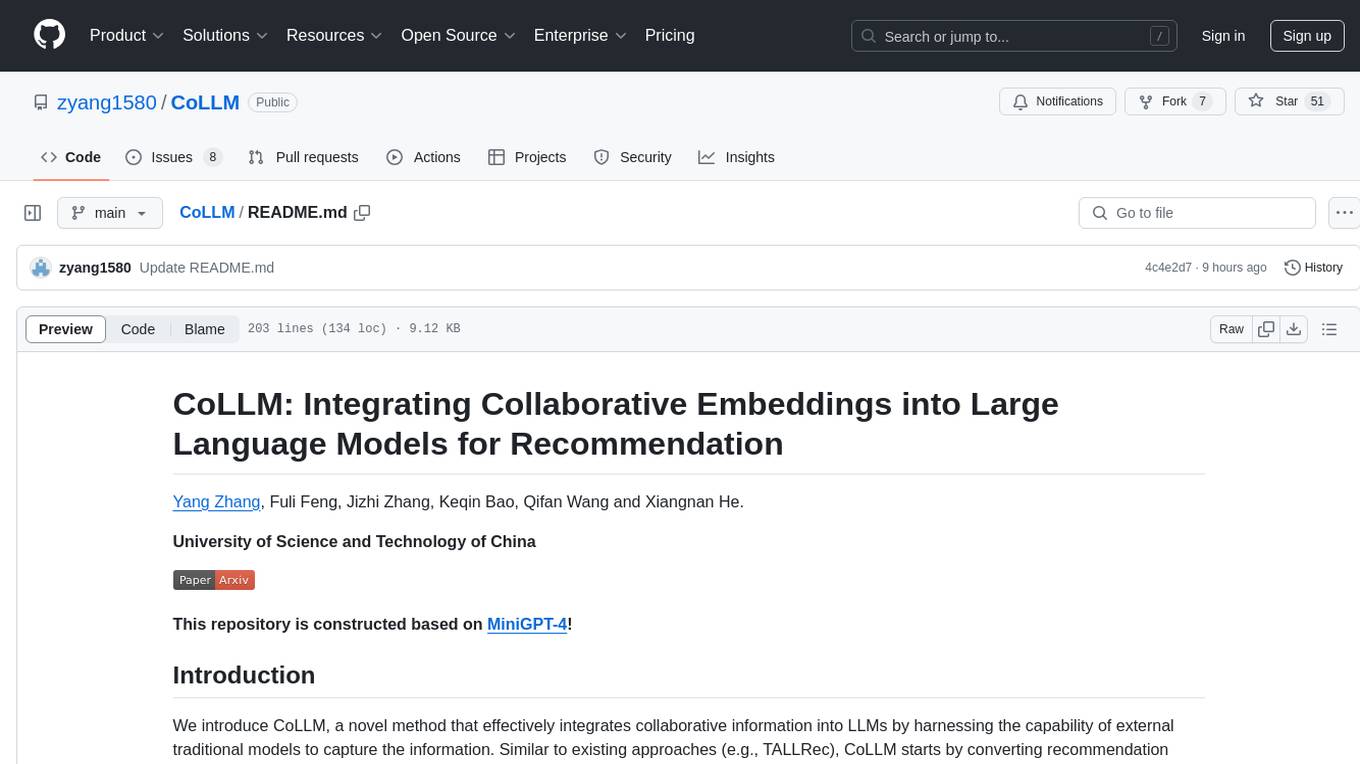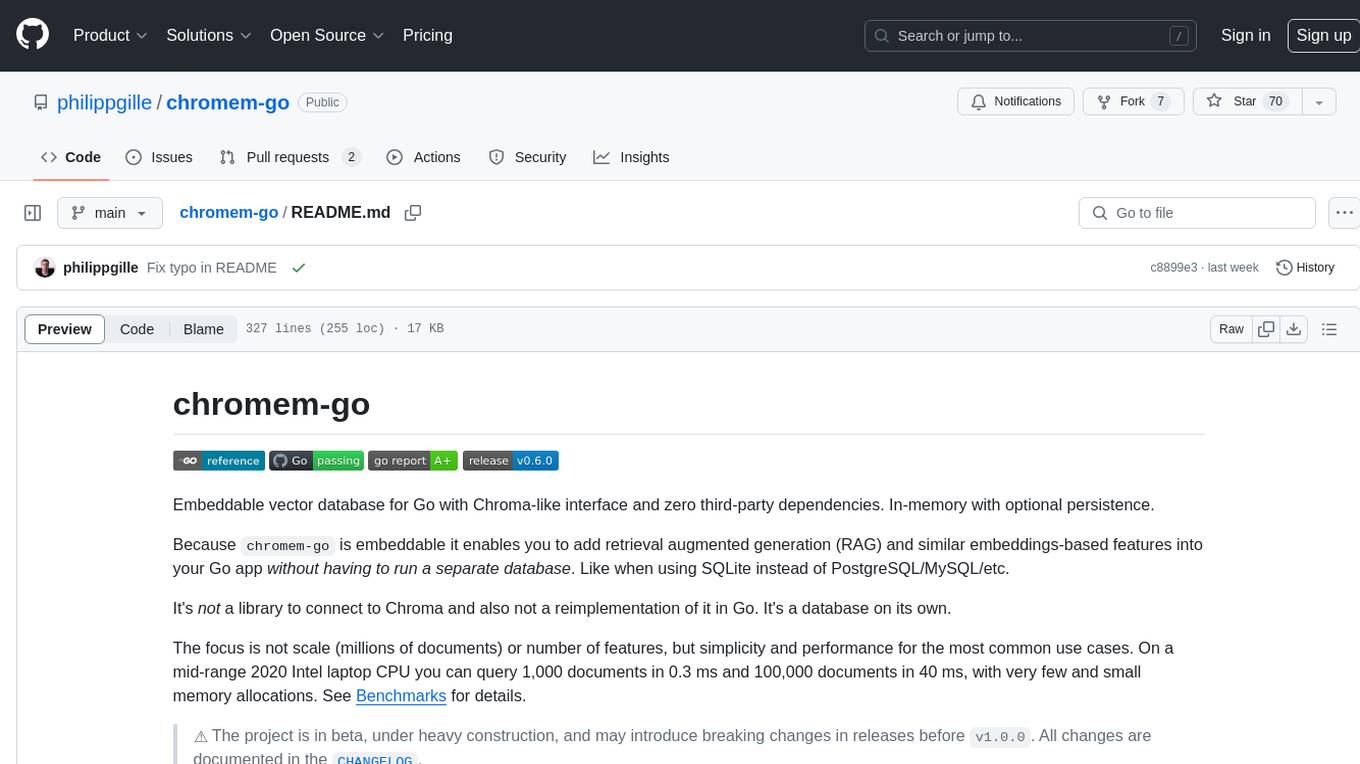AI tools for Recommendation
Related Jobs:
Related Tools:

Next App Movie & Book Recommender
The website is a platform that helps users discover their next favorite book or movie based on their preferences. Users can input their favorite books and receive recommendations for similar ones. The platform aims to provide personalized suggestions to enhance the user's entertainment experience by offering tailored recommendations for books and movies.

Read This Twice
Read This Twice is a platform dedicated to recommending books worth reading twice. It offers a curated collection of book recommendations from notable figures like Barack Obama, Bill Gates, Oprah Winfrey, and more. The platform ensures the authenticity of each recommendation and provides links to the original sources. Users can explore various reading lists, discover new books, and receive personalized recommendations through an AI-driven assistant named 'Sona.'

Software Recs
Software Recs is a free AI tool designed to provide software recommendations tailored to your specific use case. By entering your email and describing your company's activities and challenges, the tool generates personalized recommendations to assist you in your product search. The platform aims to streamline the process of finding suitable software solutions by leveraging artificial intelligence technology.

NextThreeBooks
NextThreeBooks.com is an AI-powered book recommendation platform that helps users find their perfect book match based on their reading preferences. Users can share their reading preferences with the AI-powered engine, which then provides personalized book suggestions tailored to their preferences. The platform uses GPT-3 to offer three carefully curated book recommendations with detailed explanations, making it easier for users to discover their next favorite read. NextThreeBooks.com has recommended books to users in over 80 countries and has been featured in various newsletters, building a growing community of readers.

Vinetribe
Vinetribe is a platform that offers personalized wine recommendations from local shops, curated by trusted creators. The platform aims to make wine more accessible by providing a user-friendly experience for discovering new wines. With the Supermarket Wine Finder feature, users can easily find the perfect wine for their preferences and occasions. Vinetribe is founded on the idea of bringing people together through the enjoyment of wine, making the wine selection process less daunting and more enjoyable.

ChefGPT
ChefGPT is an AI-powered personal chef application that offers recipe recommendations, meal planning, and cooking assistance. With features like PantryChef for utilizing existing ingredients, MasterChef for recipe customization, MacrosChef for macronutrient-based recipes, MealPlanChef for fitness goals, PairPerfect for food and drink pairing, and MixologyMaestro for cocktail recipes, ChefGPT revolutionizes meal preparation and cooking experience. Users can enjoy personalized, healthy, and delicious recipes tailored to their dietary requirements and lifestyle, making meal planning easier and more enjoyable.

Piper App
Piper App is an AI-powered platform that provides personalized product recommendations in fashion, beauty, home, and lifestyle. It simplifies the search process by offering quick and uncluttered answers based on a vast database of first-hand recommendations. Users can join the waitlist to be among the first to experience the smart choices made simple by Piper.
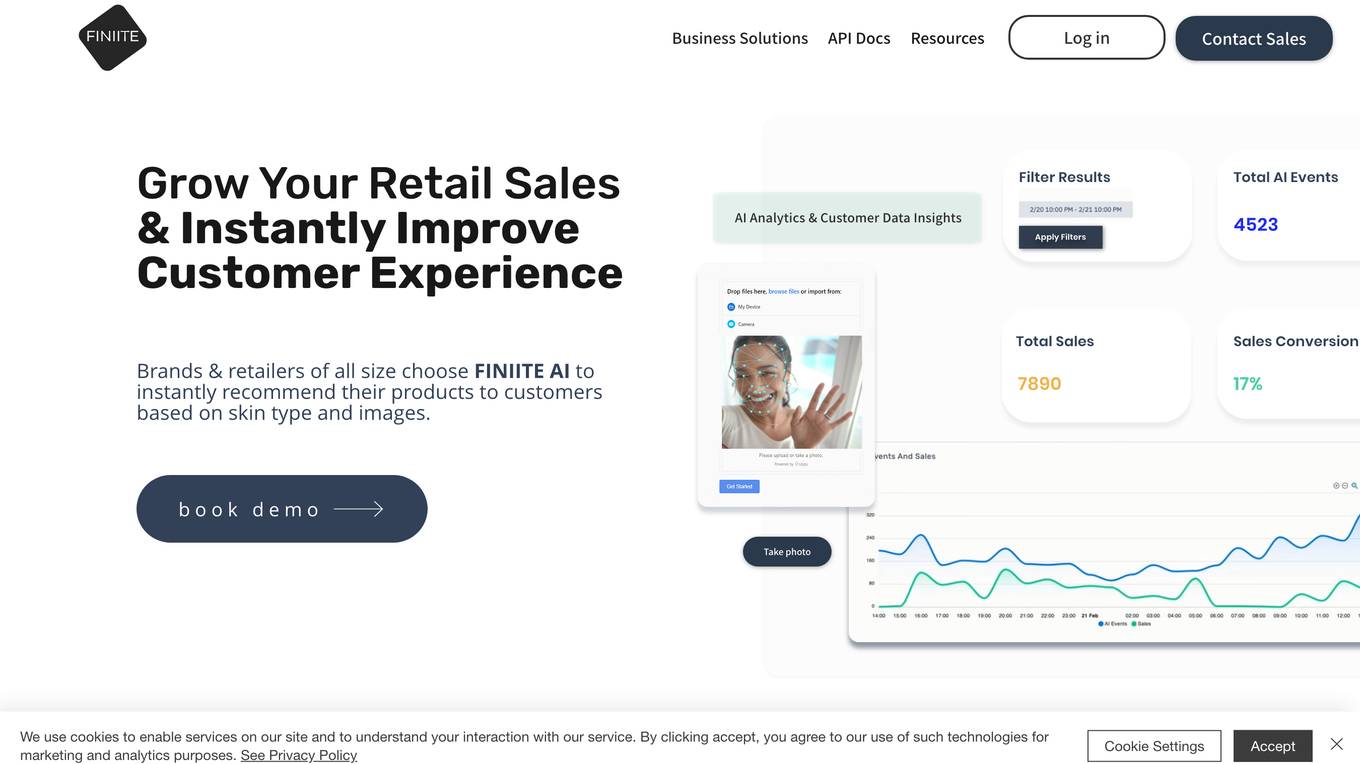
FINIITE AI
FINIITE AI is a retail and brand marketing solution that uses AI to help businesses grow their sales and improve customer experience. The company's flagship product is a product recommendation engine that uses AI to personalize product recommendations for each customer. FINIITE AI also offers a suite of other AI-powered solutions, including a skin check tool, a customer data insights platform, and a CRM integration. FINIITE AI's solutions are used by businesses of all sizes, from small businesses to large enterprises.

Crossing Minds
Crossing Minds is a premium recommendation engine that helps businesses personalize their commerce experiences and increase conversions. It offers a range of features including search and discovery, personalized recommendations, and behavior-based recommendations. Crossing Minds is trusted by brands like Inkbox, HobbyLink Japan, and Eventbrite, and has been shown to increase conversion rates by up to 440%.
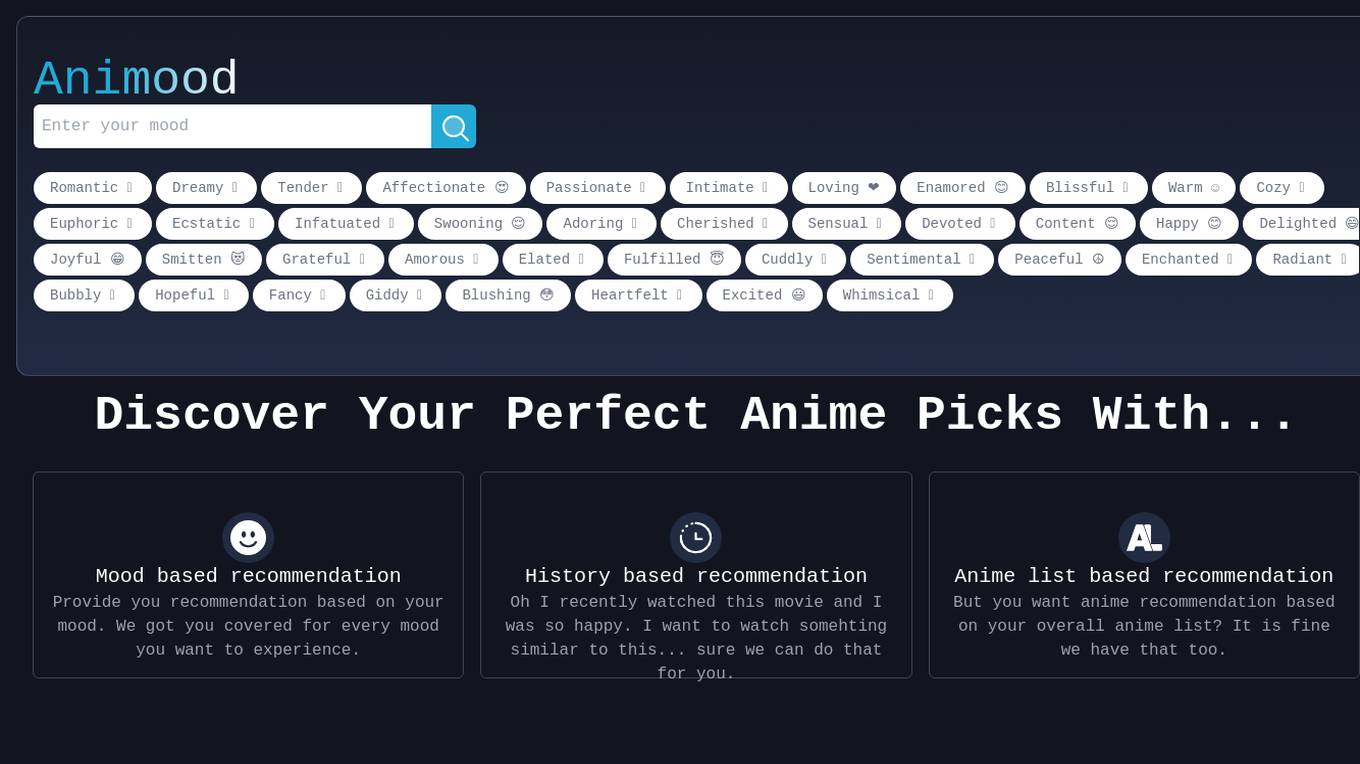
Animood
Animood is an AI tool that provides mood-based anime recommendations. It analyzes your mood and offers personalized anime suggestions to match your emotions. Whether you're feeling romantic, dreamy, affectionate, or any other emotion, Animood ensures you find the perfect anime to suit your mood. With features like mood-based, history-based, and anime list-based recommendations, Animood caters to all anime enthusiasts seeking tailored suggestions.

AMBLR
AMBLR is a free travel planner that uses AI to create personalized vacation recommendations based on your preferences. With AMBLR, you can easily find things to do in any city, add places you want to visit, select your budget, and choose your interests. AMBLR will then generate a customized itinerary for you, complete with suggested activities, restaurants, and accommodations.

Stocked
Stocked is an AI-powered stock advisory service that provides monthly stock recommendations to help investors build a portfolio that outperforms the S&P 500. The service uses machine learning models to analyze terabytes of data and identify stocks with the highest potential for growth. Stocked is designed for buy-and-hold investors who are looking to significantly grow their portfolio over long periods of time.

AppSec Assistant
AppSec Assistant is an AI-powered application designed to provide automated security recommendations in Jira Cloud. It focuses on ensuring data security by enabling secure-by-design software development. The tool simplifies setup by allowing users to add their OpenAI API key and organization, encrypts and stores data using Atlassian's Storage API, and provides tailored security recommendations for each ticket to reduce manual AppSec reviews. AppSec Assistant empowers developers by keeping up with their pace and helps in easing the security review bottleneck.

Lucy | Recommends Media
Your Go-To Guide for Personalized Movie, TV, Anime, and Song Recommendations.

Letter of Recommendation Expert
A counselor aiding in writing recommendation letters for PhD applications, with a formal and informative tone.
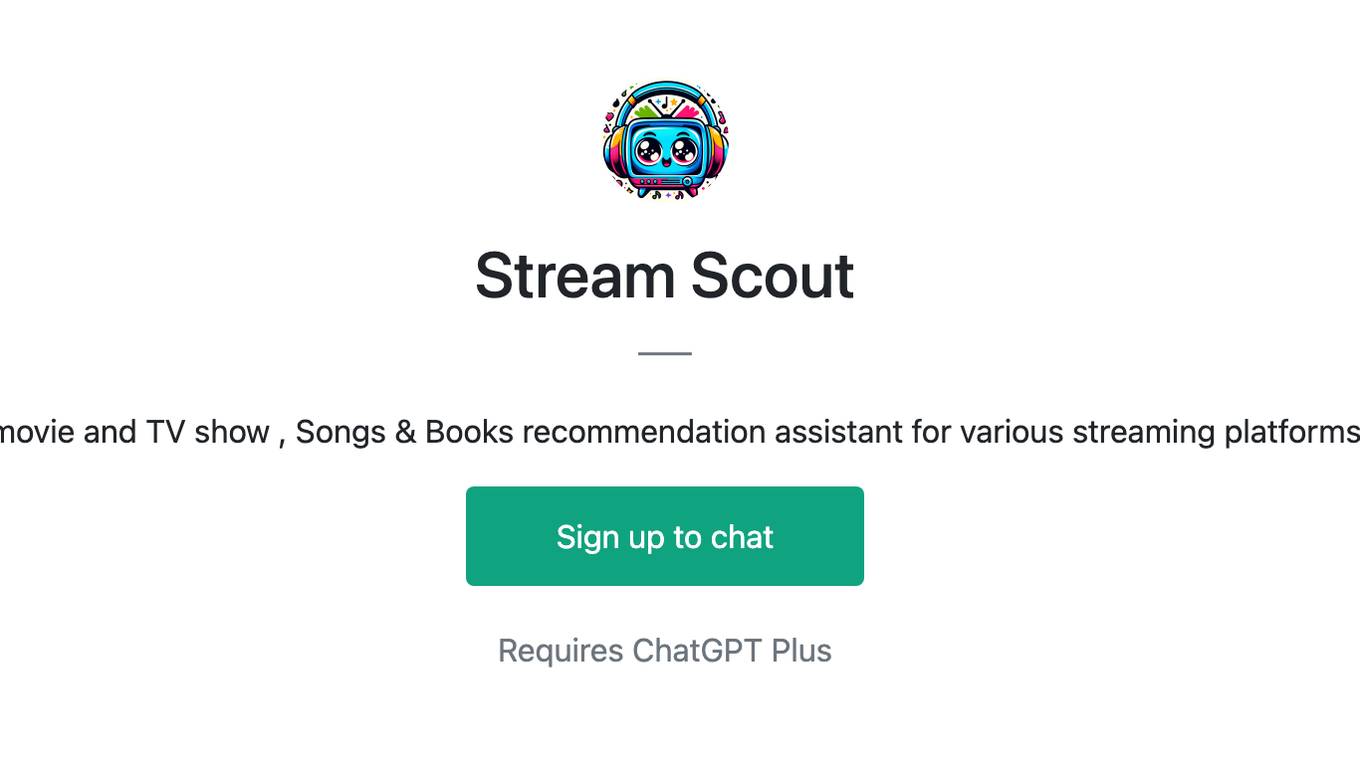
Stream Scout
A movie and TV show , Songs & Books recommendation assistant for various streaming platforms.
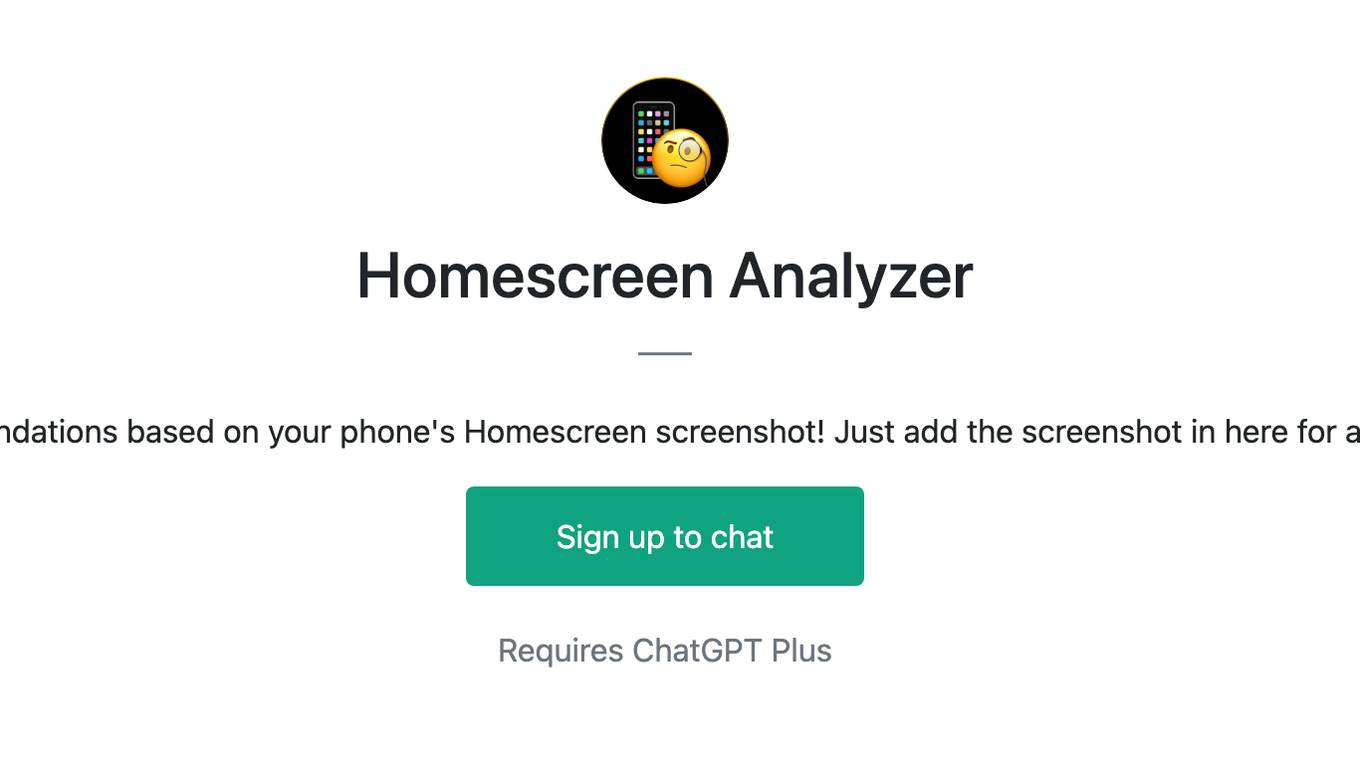
Homescreen Analyzer
Get recommendations based on your phone's Homescreen screenshot! Just add the screenshot in here for analysis 📱🧐

AI Tools Consultant
Get recommendations of best AI & no-code tools you can use for any task
TB Order Recommendation System
Given a set of Parameters, Provides a set of Order Recommendations
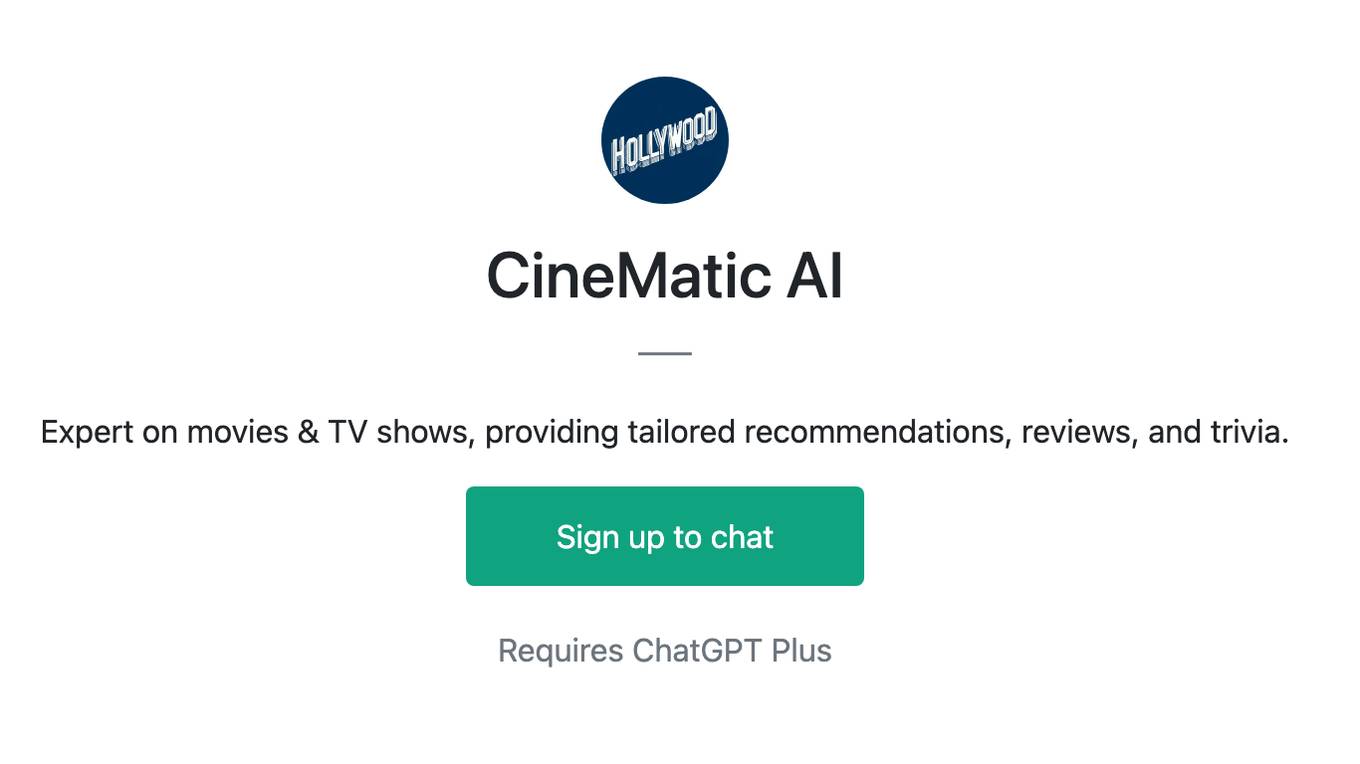
CineMatic AI
Expert on movies & TV shows, providing tailored recommendations, reviews, and trivia.

Gbusiness | TVBuddy | MyHulu Guru
With deep knowledge of content that is available on Hulu, I specialize in enhancing your Hulu viewing experience with personalized recommendations, insightful trivia, and contextual information.

Manga Concierge
A manga expert providing personalized recommendations what you want to read now.

Best Bollywood Movies Recommendations
Expert in Bollywood movies, provides tailored recommendations.
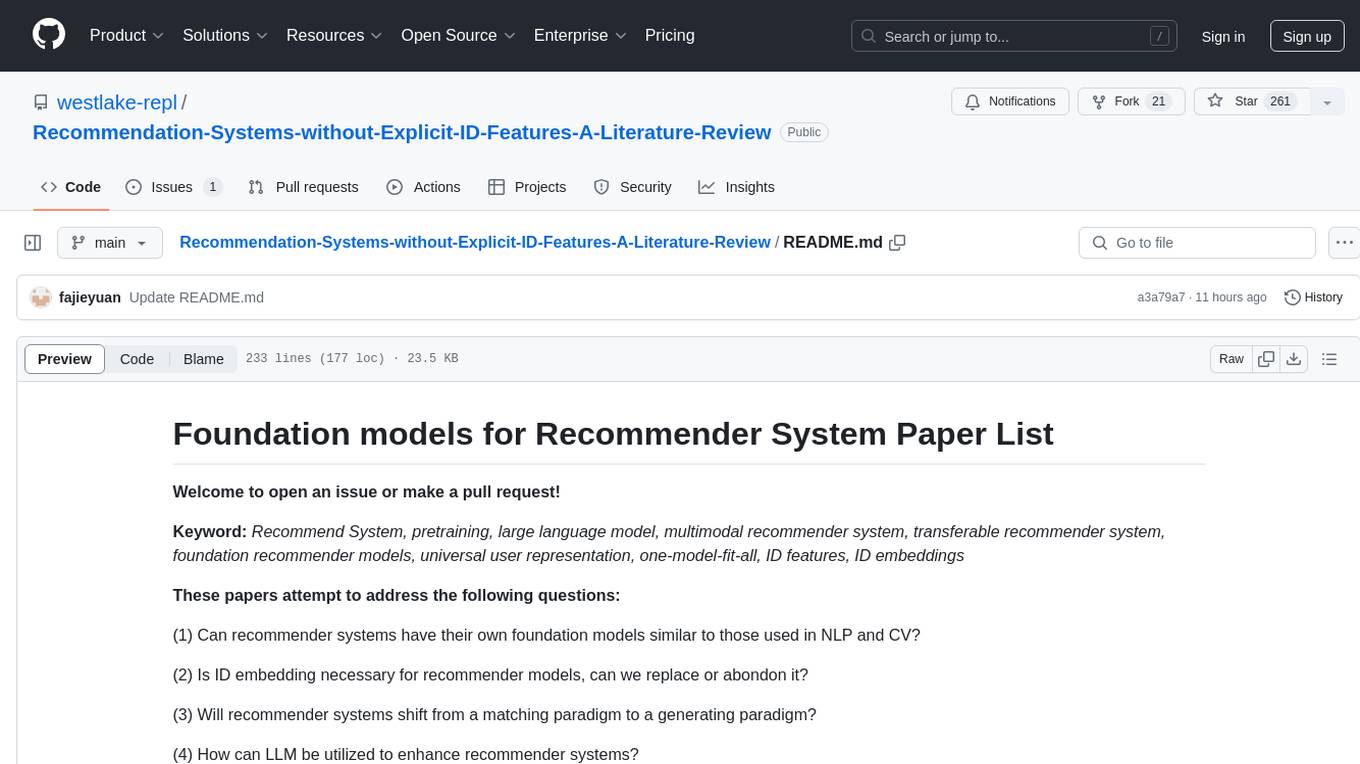
Recommendation-Systems-without-Explicit-ID-Features-A-Literature-Review
This repository is a collection of papers and resources related to recommendation systems, focusing on foundation models, transferable recommender systems, large language models, and multimodal recommender systems. It explores questions such as the necessity of ID embeddings, the shift from matching to generating paradigms, and the future of multimodal recommender systems. The papers cover various aspects of recommendation systems, including pretraining, user representation, dataset benchmarks, and evaluation methods. The repository aims to provide insights and advancements in the field of recommendation systems through literature reviews, surveys, and empirical studies.
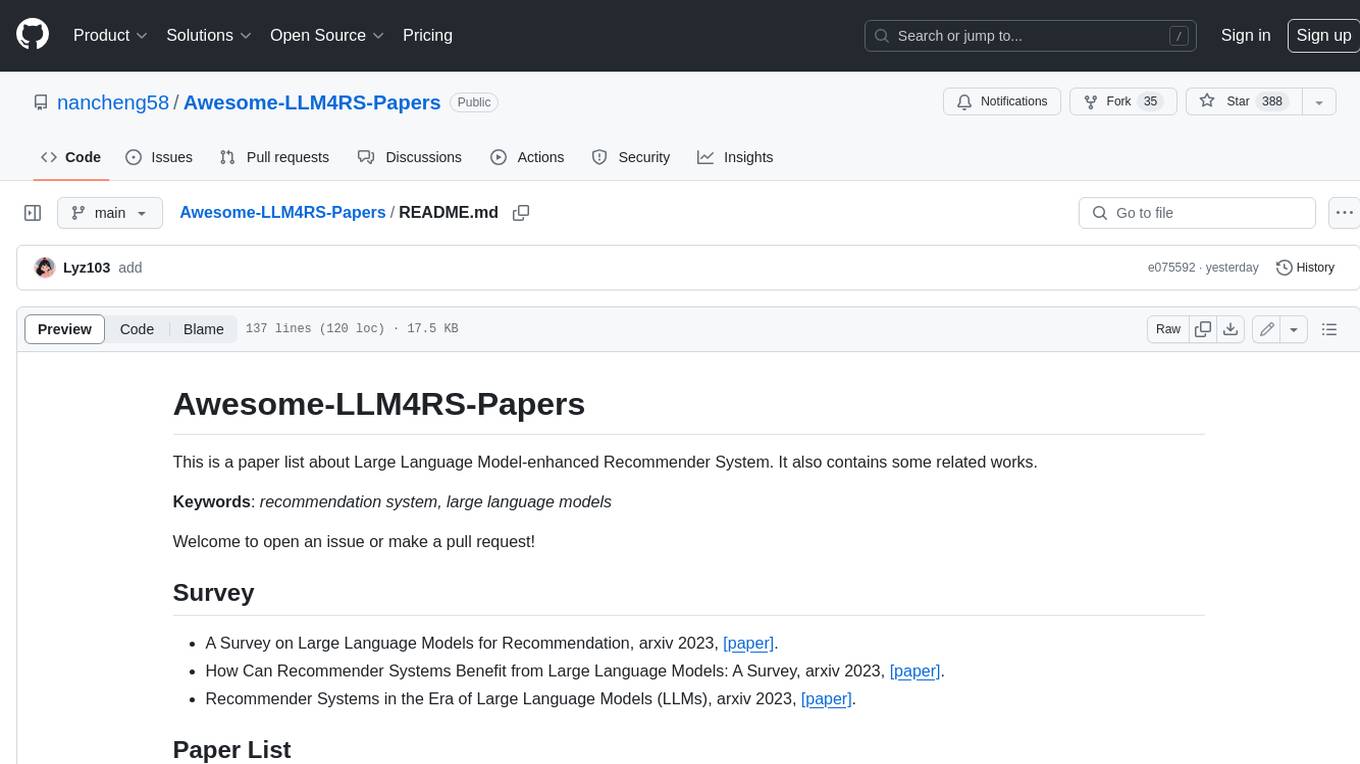
Awesome-LLM4RS-Papers
This paper list is about Large Language Model-enhanced Recommender System. It also contains some related works. Keywords: recommendation system, large language models
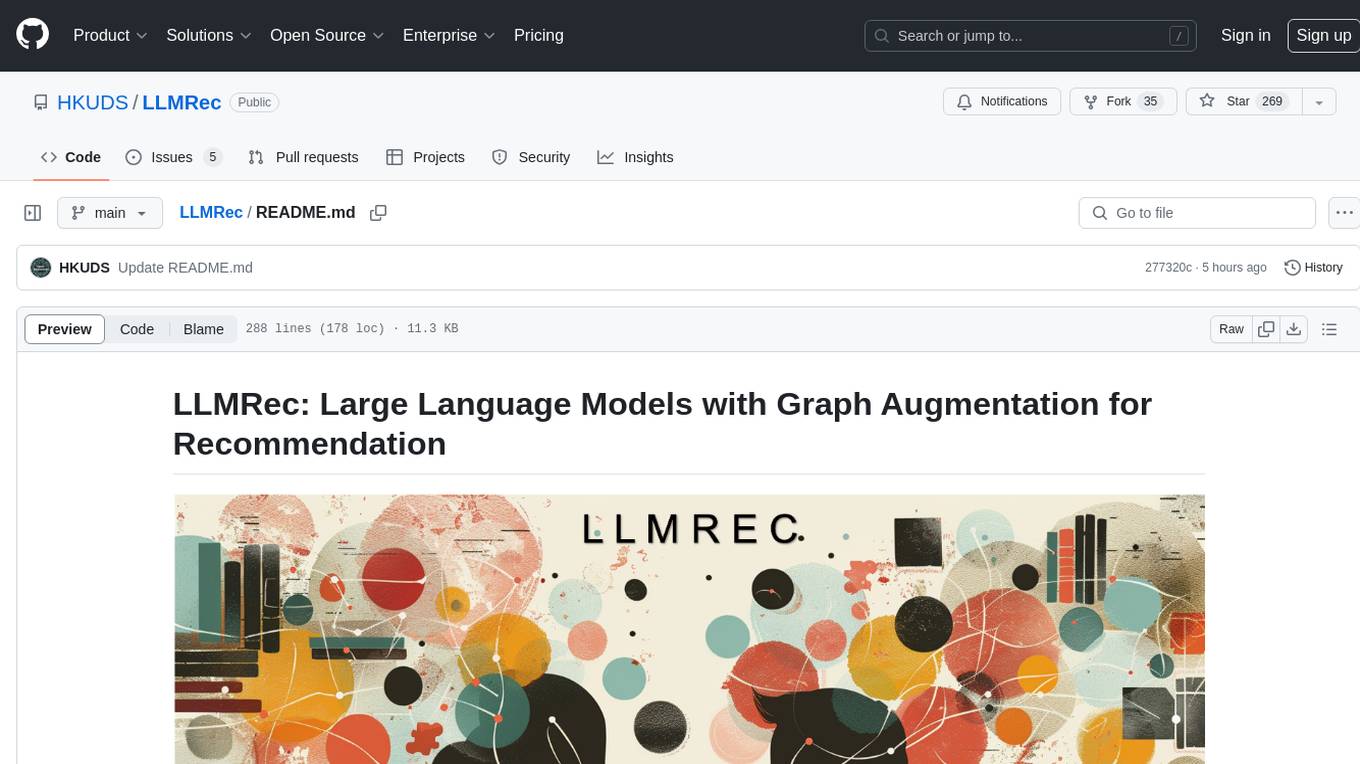
LLMRec
LLMRec is a PyTorch implementation for the WSDM 2024 paper 'Large Language Models with Graph Augmentation for Recommendation'. It is a novel framework that enhances recommenders by applying LLM-based graph augmentation strategies to recommendation systems. The tool aims to make the most of content within online platforms to augment interaction graphs by reinforcing u-i interactive edges, enhancing item node attributes, and conducting user node profiling from a natural language perspective.
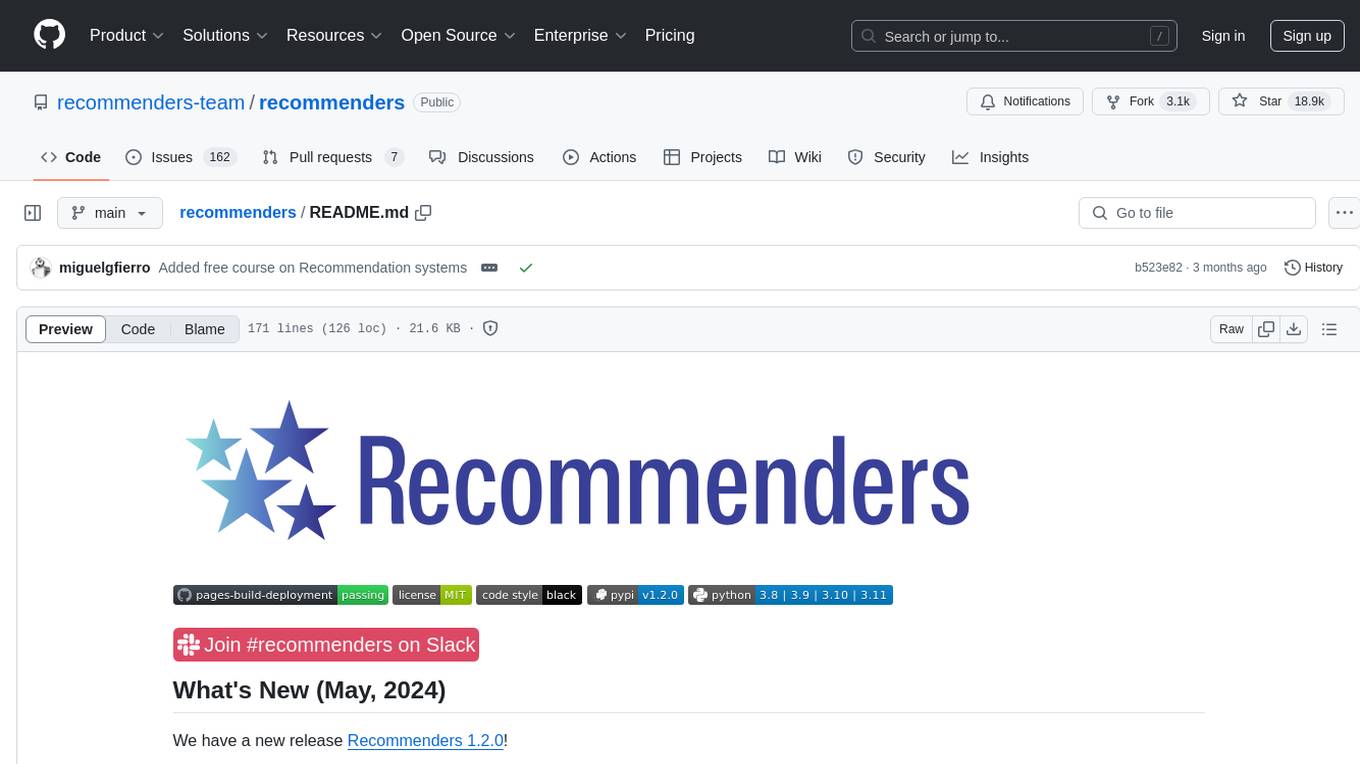
recommenders
Recommenders is a project under the Linux Foundation of AI and Data that assists researchers, developers, and enthusiasts in prototyping, experimenting with, and bringing to production a range of classic and state-of-the-art recommendation systems. The repository contains examples and best practices for building recommendation systems, provided as Jupyter notebooks. It covers tasks such as preparing data, building models using various recommendation algorithms, evaluating algorithms, tuning hyperparameters, and operationalizing models in a production environment on Azure. The project provides utilities to support common tasks like loading datasets, evaluating model outputs, and splitting training/test data. It includes implementations of state-of-the-art algorithms for self-study and customization in applications.
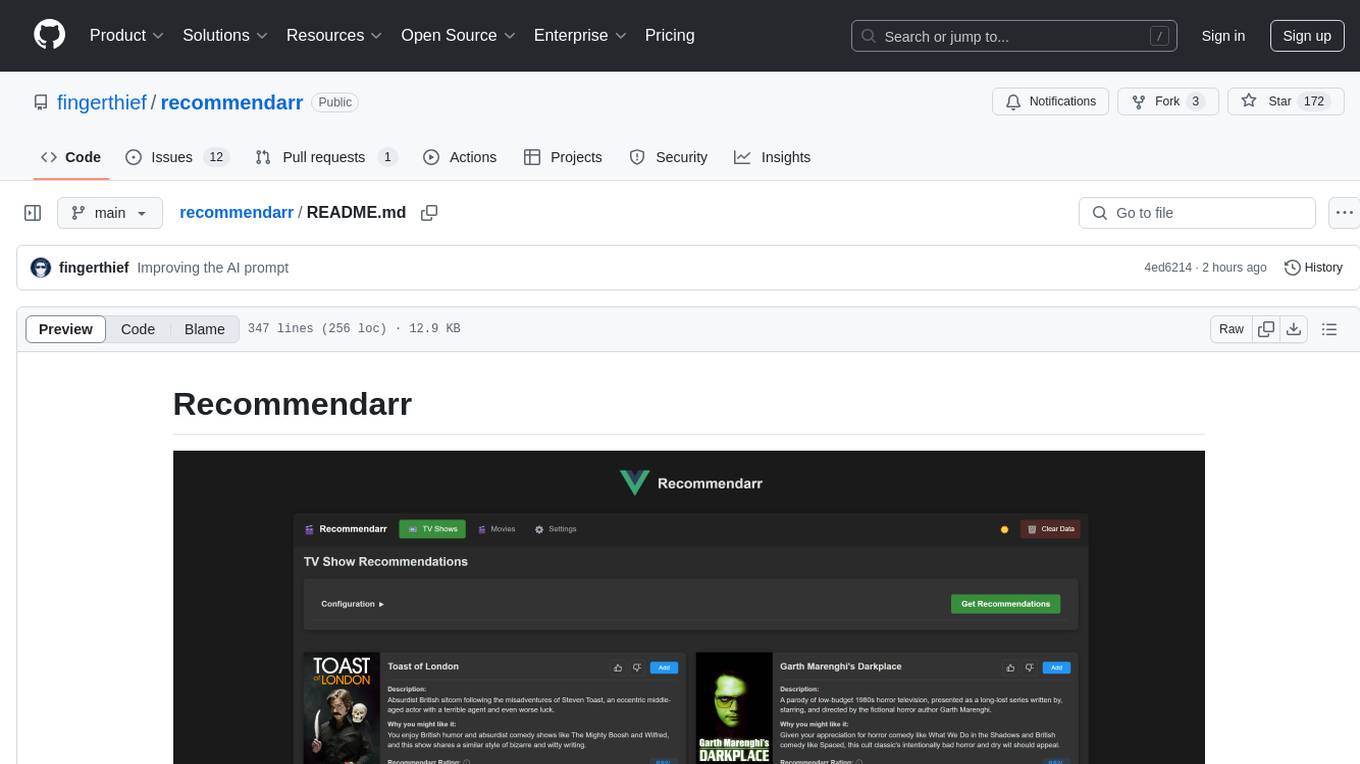
recommendarr
Recommendarr is a tool that generates personalized TV show and movie recommendations based on your Sonarr, Radarr, Plex, and Jellyfin libraries using AI. It offers AI-powered recommendations, media server integration, flexible AI support, watch history analysis, customization options, and dark/light mode toggle. Users can connect their media libraries and watch history services, configure AI service settings, and get personalized recommendations based on genre, language, and mood/vibe preferences. The tool works with any OpenAI-compatible API and offers various recommended models for different cost options and performance levels. It provides personalized suggestions, detailed information, filter options, watch history analysis, and one-click adding of recommended content to Sonarr/Radarr.
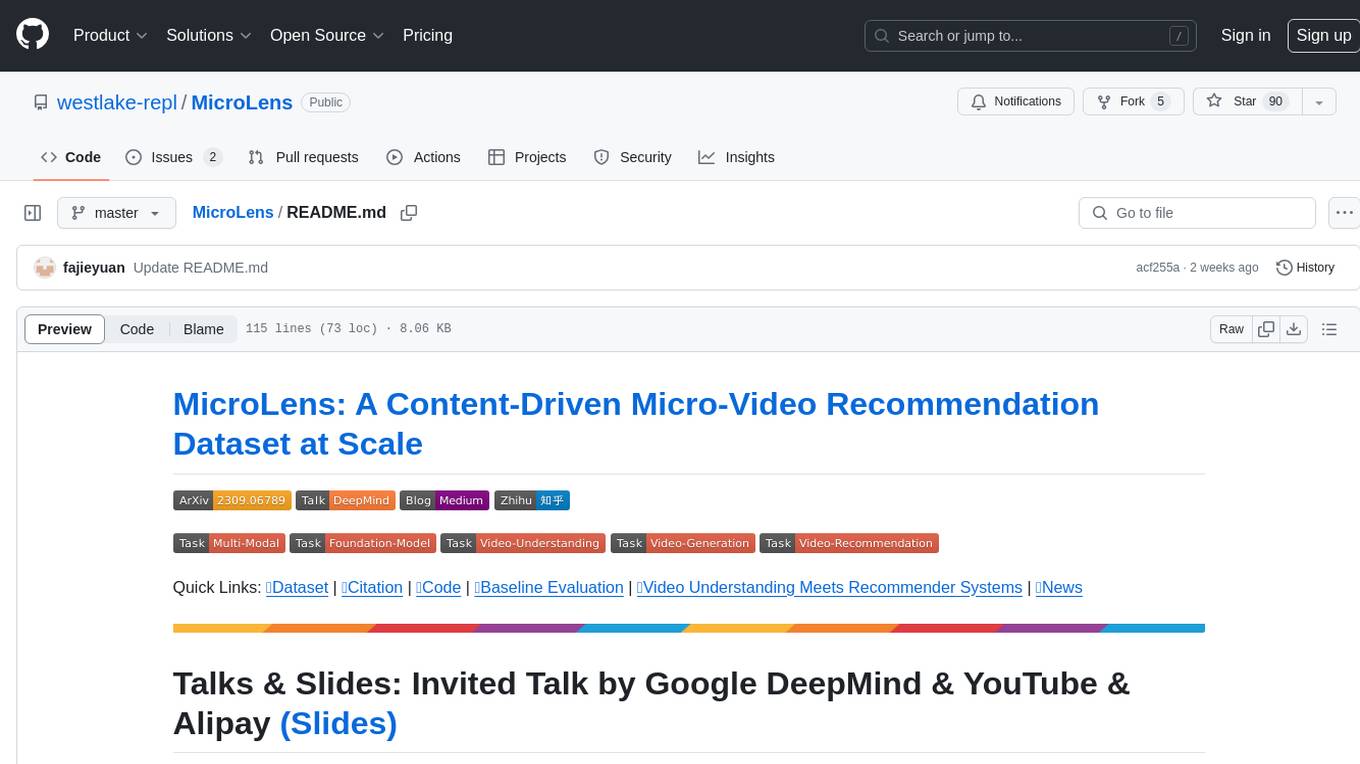
MicroLens
MicroLens is a content-driven micro-video recommendation dataset at scale. It provides a large dataset with multimodal data, including raw text, images, audio, video, and video comments, for tasks such as multi-modal recommendation, foundation model building, and fairness recommendation. The dataset is available in two versions: MicroLens-50K and MicroLens-100K, with extracted features for multimodal recommendation tasks. Researchers can access the dataset through provided links and reach out to the corresponding author for the complete dataset. The repository also includes codes for various algorithms like VideoRec, IDRec, and VIDRec, each implementing different video models and baselines.
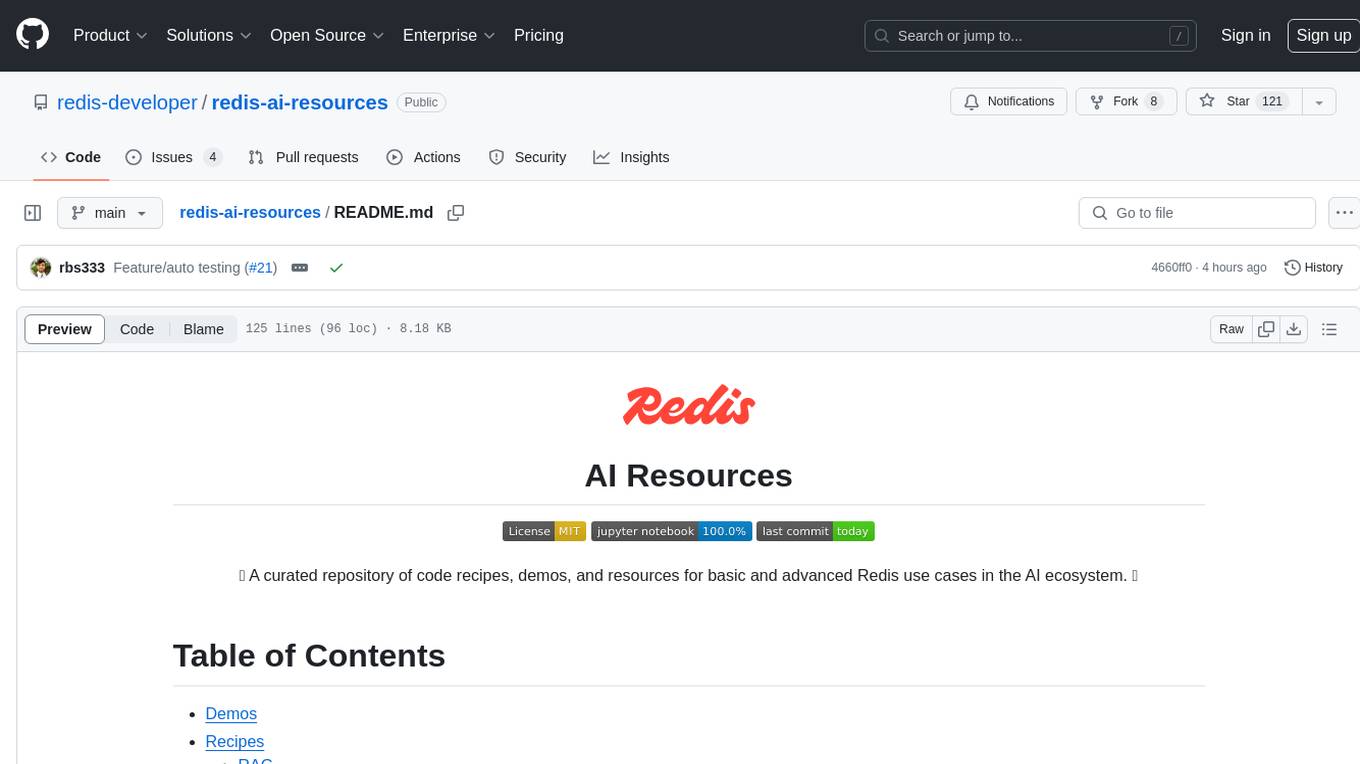
redis-ai-resources
A curated repository of code recipes, demos, and resources for basic and advanced Redis use cases in the AI ecosystem. It includes demos for ArxivChatGuru, Redis VSS, Vertex AI & Redis, Agentic RAG, ArXiv Search, and Product Search. Recipes cover topics like Getting started with RAG, Semantic Cache, Advanced RAG, and Recommendation systems. The repository also provides integrations/tools like RedisVL, AWS Bedrock, LangChain Python, LangChain JS, LlamaIndex, Semantic Kernel, RelevanceAI, and DocArray. Additional content includes blog posts, talks, reviews, and documentation related to Vector Similarity Search, AI-Powered Document Search, Vector Databases, Real-Time Product Recommendations, and more. Benchmarks compare Redis against other Vector Databases and ANN benchmarks. Documentation includes QuickStart guides, official literature for Vector Similarity Search, Redis-py client library docs, Redis Stack documentation, and Redis client list.
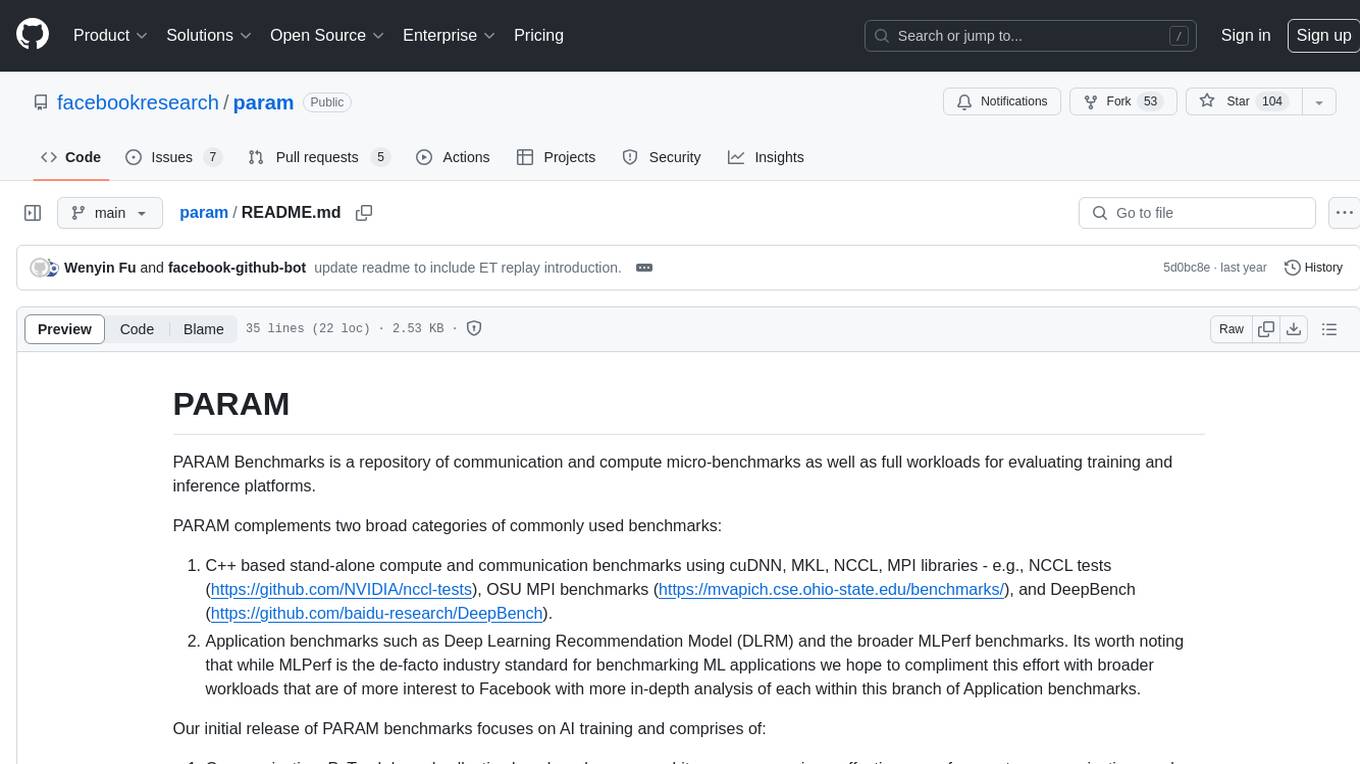
param
PARAM Benchmarks is a repository of communication and compute micro-benchmarks as well as full workloads for evaluating training and inference platforms. It complements commonly used benchmarks by focusing on AI training with PyTorch based collective benchmarks, GEMM, embedding lookup, linear layer, and DLRM communication patterns. The tool bridges the gap between stand-alone C++ benchmarks and PyTorch/Tensorflow based application benchmarks, providing deep insights into system architecture and framework-level overheads.
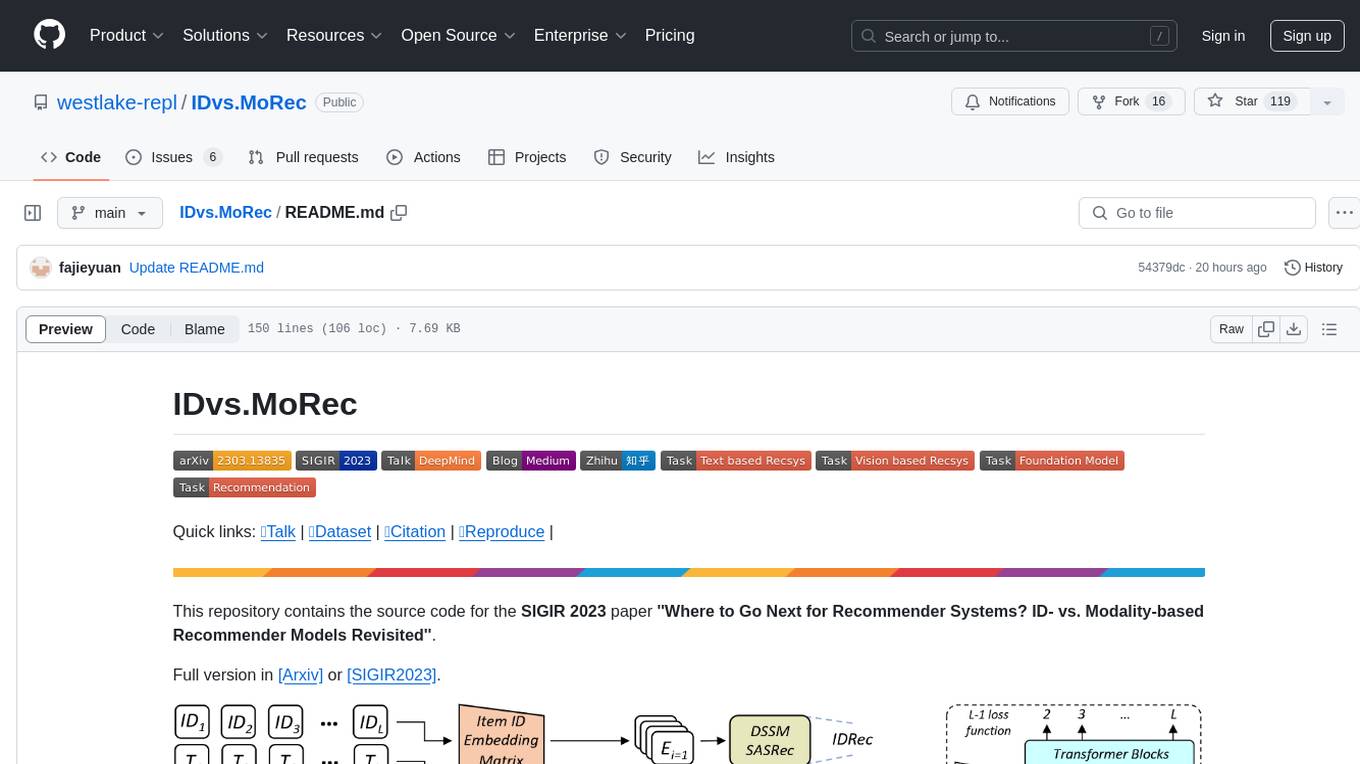
IDvs.MoRec
This repository contains the source code for the SIGIR 2023 paper 'Where to Go Next for Recommender Systems? ID- vs. Modality-based Recommender Models Revisited'. It provides resources for evaluating foundation, transferable, multi-modal, and LLM recommendation models, along with datasets, pre-trained models, and training strategies for IDRec and MoRec using in-batch debiased cross-entropy loss. The repository also offers large-scale datasets, code for SASRec with in-batch debias cross-entropy loss, and information on joining the lab for research opportunities.
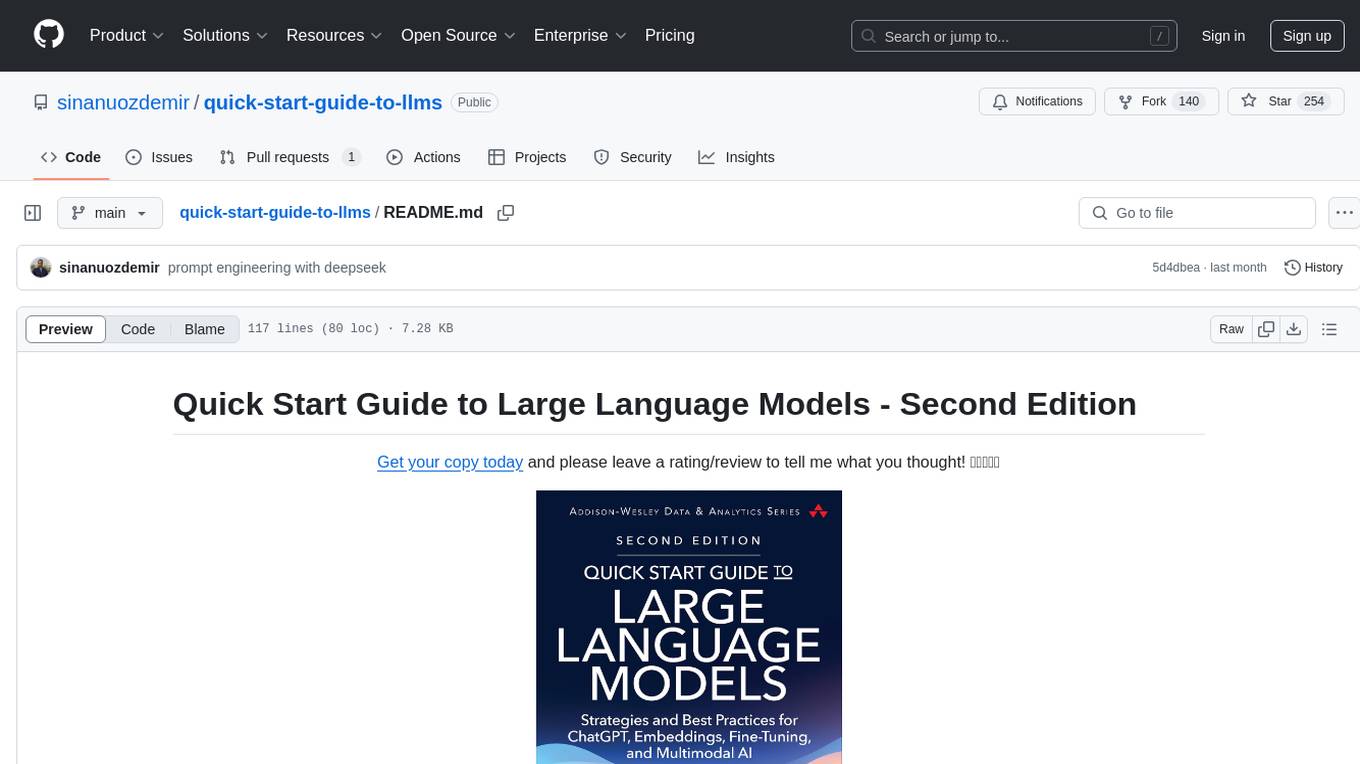
quick-start-guide-to-llms
This GitHub repository serves as the companion to the 'Quick Start Guide to Large Language Models - Second Edition' book. It contains code snippets and notebooks demonstrating various applications and advanced techniques in working with Transformer models and large language models (LLMs). The repository is structured into directories for notebooks, data, and images, with each notebook corresponding to a chapter in the book. Users can explore topics such as semantic search, prompt engineering, model fine-tuning, custom embeddings, advanced LLM usage, moving LLMs into production, and evaluating LLMs. The repository aims to provide practical examples and insights for working with LLMs in different contexts.
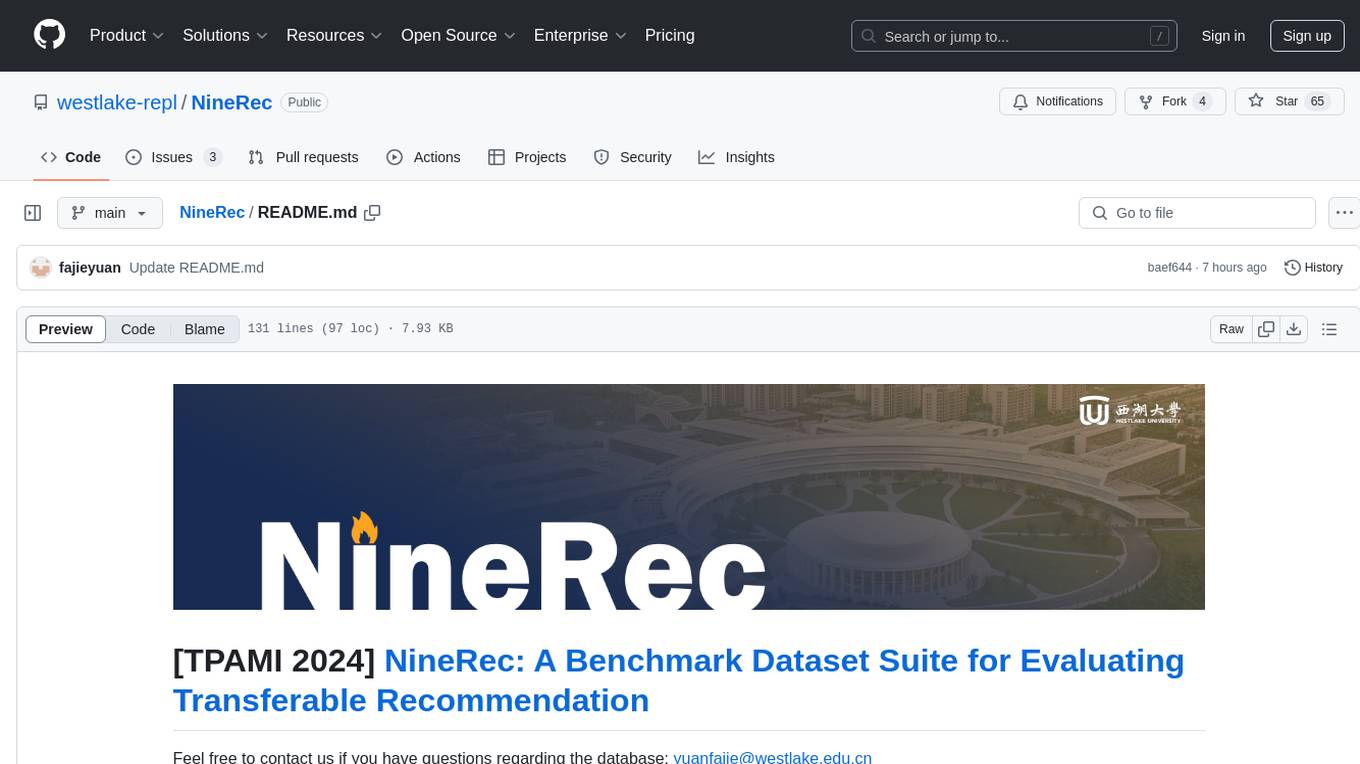
NineRec
NineRec is a benchmark dataset suite for evaluating transferable recommendation models. It provides datasets for pre-training and transfer learning in recommender systems, focusing on multimodal and foundation model tasks. The dataset includes user-item interactions, item texts in multiple languages, item URLs, and raw images. Researchers can use NineRec to develop more effective and efficient methods for pre-training recommendation models beyond end-to-end training. The dataset is accompanied by code for dataset preparation, training, and testing in PyTorch environment.
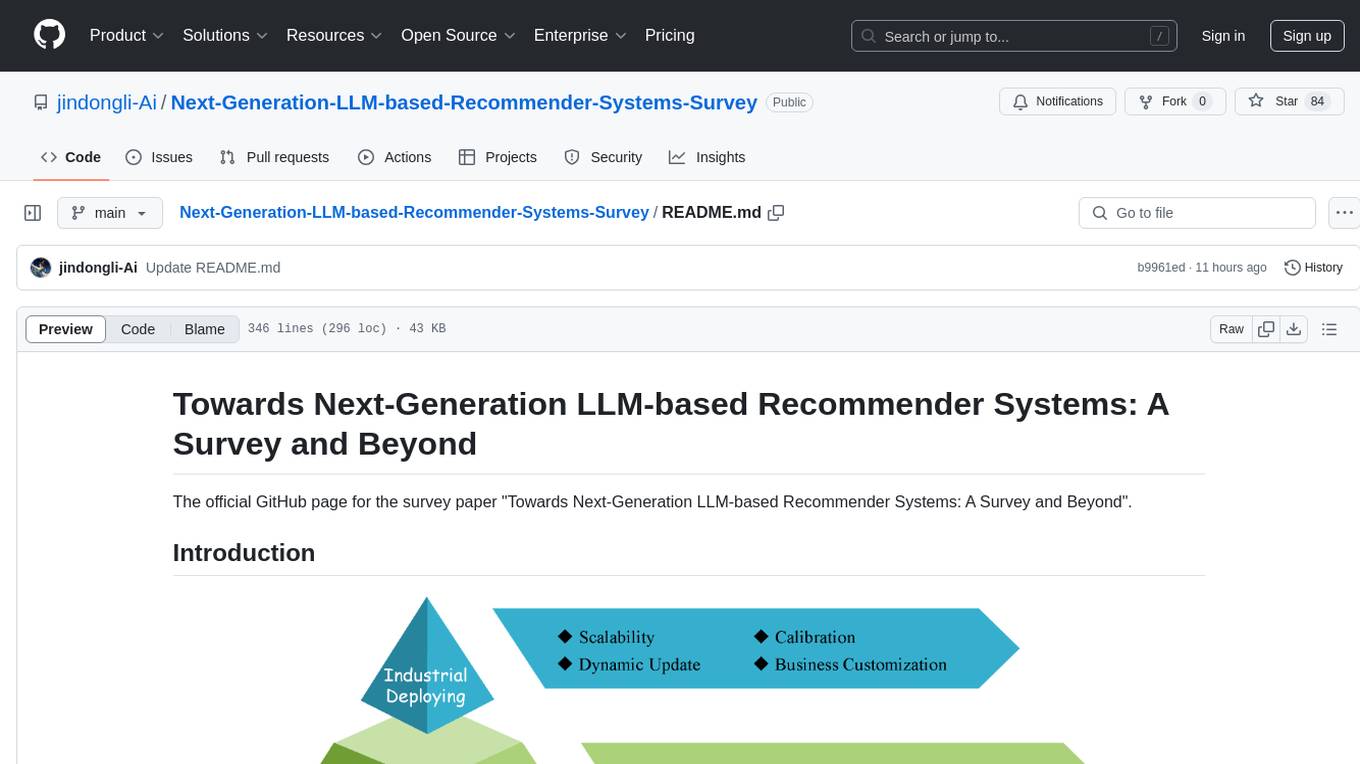
Next-Generation-LLM-based-Recommender-Systems-Survey
The Next-Generation LLM-based Recommender Systems Survey is a comprehensive overview of the latest advancements in recommender systems leveraging Large Language Models (LLMs). The survey covers various paradigms, approaches, and applications of LLMs in recommendation tasks, including generative and non-generative models, multimodal recommendations, personalized explanations, and industrial deployment. It discusses the comparison with existing surveys, different paradigms, and specific works in the field. The survey also addresses challenges and future directions in the domain of LLM-based recommender systems.
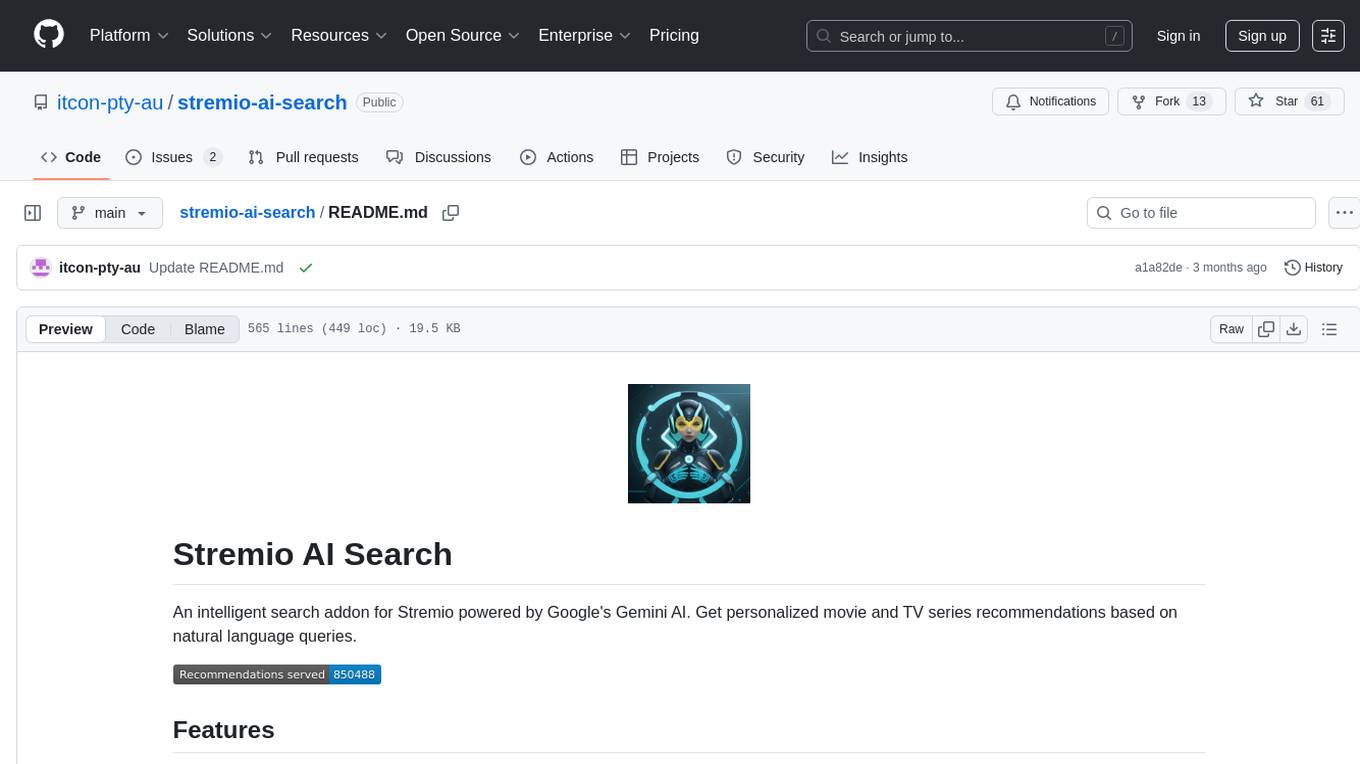
stremio-ai-search
Stremio AI Search is an intelligent search addon powered by Google's Gemini AI, providing personalized movie and TV series recommendations based on natural language queries. It integrates with Trakt for personalized suggestions, allows selection of Google AI models, and offers TMDB integration for a content-rich catalog. RPDB integration provides access to posters with ratings. Users can configure API keys, set recommendation limits, and enjoy a wide range of query ideas for versatile content discovery.
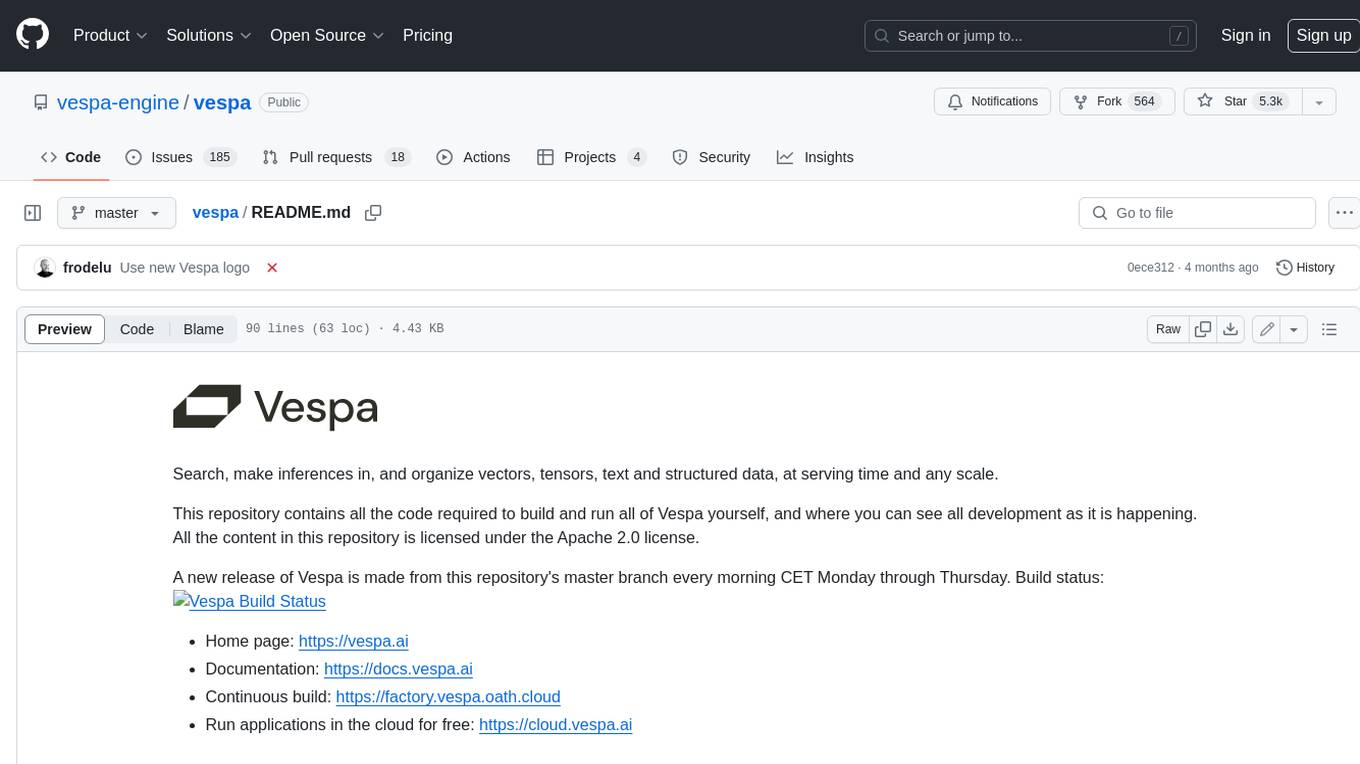
vespa
Vespa is a platform that performs operations such as selecting a subset of data in a large corpus, evaluating machine-learned models over the selected data, organizing and aggregating it, and returning it, typically in less than 100 milliseconds, all while the data corpus is continuously changing. It has been in development for many years and is used on a number of large internet services and apps which serve hundreds of thousands of queries from Vespa per second.
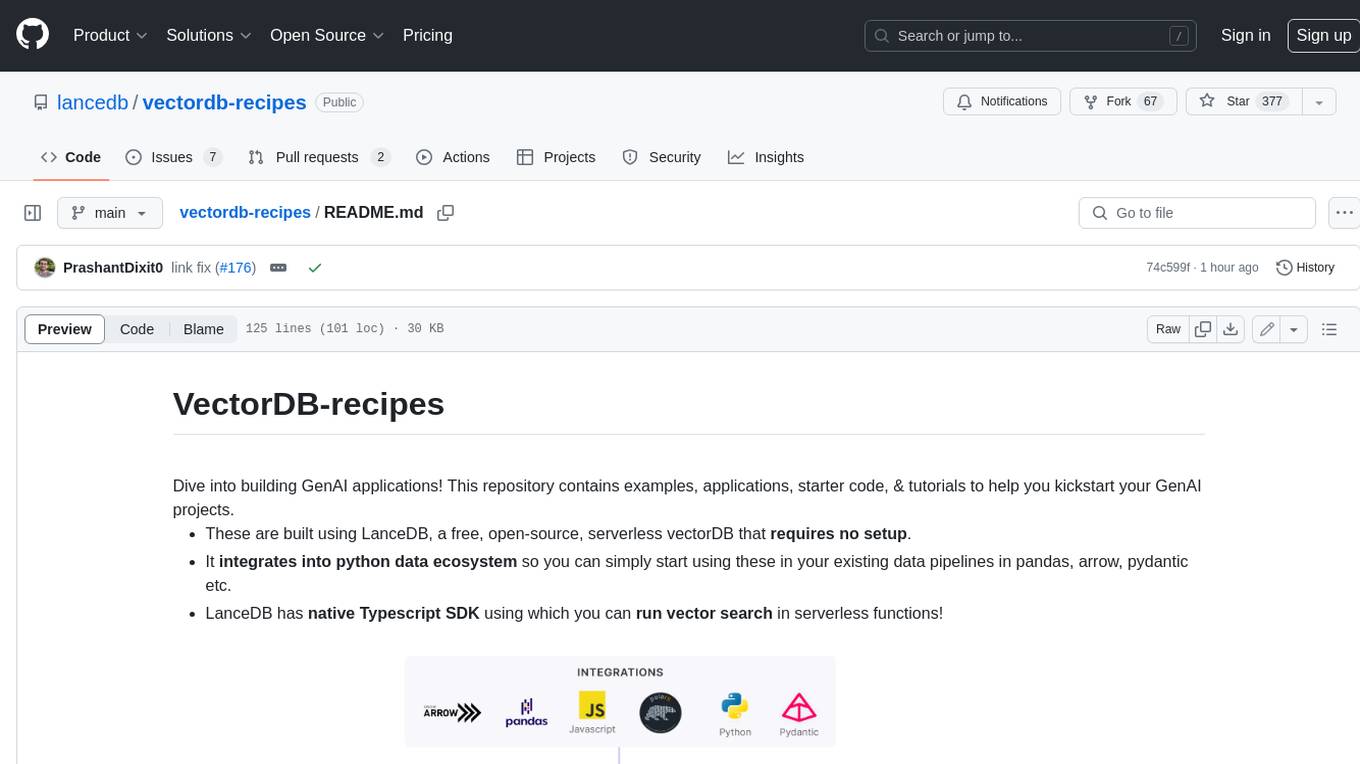
vectordb-recipes
This repository contains examples, applications, starter code, & tutorials to help you kickstart your GenAI projects. * These are built using LanceDB, a free, open-source, serverless vectorDB that **requires no setup**. * It **integrates into python data ecosystem** so you can simply start using these in your existing data pipelines in pandas, arrow, pydantic etc. * LanceDB has **native Typescript SDK** using which you can **run vector search** in serverless functions! This repository is divided into 3 sections: - Examples - Get right into the code with minimal introduction, aimed at getting you from an idea to PoC within minutes! - Applications - Ready to use Python and web apps using applied LLMs, VectorDB and GenAI tools - Tutorials - A curated list of tutorials, blogs, Colabs and courses to get you started with GenAI in greater depth.
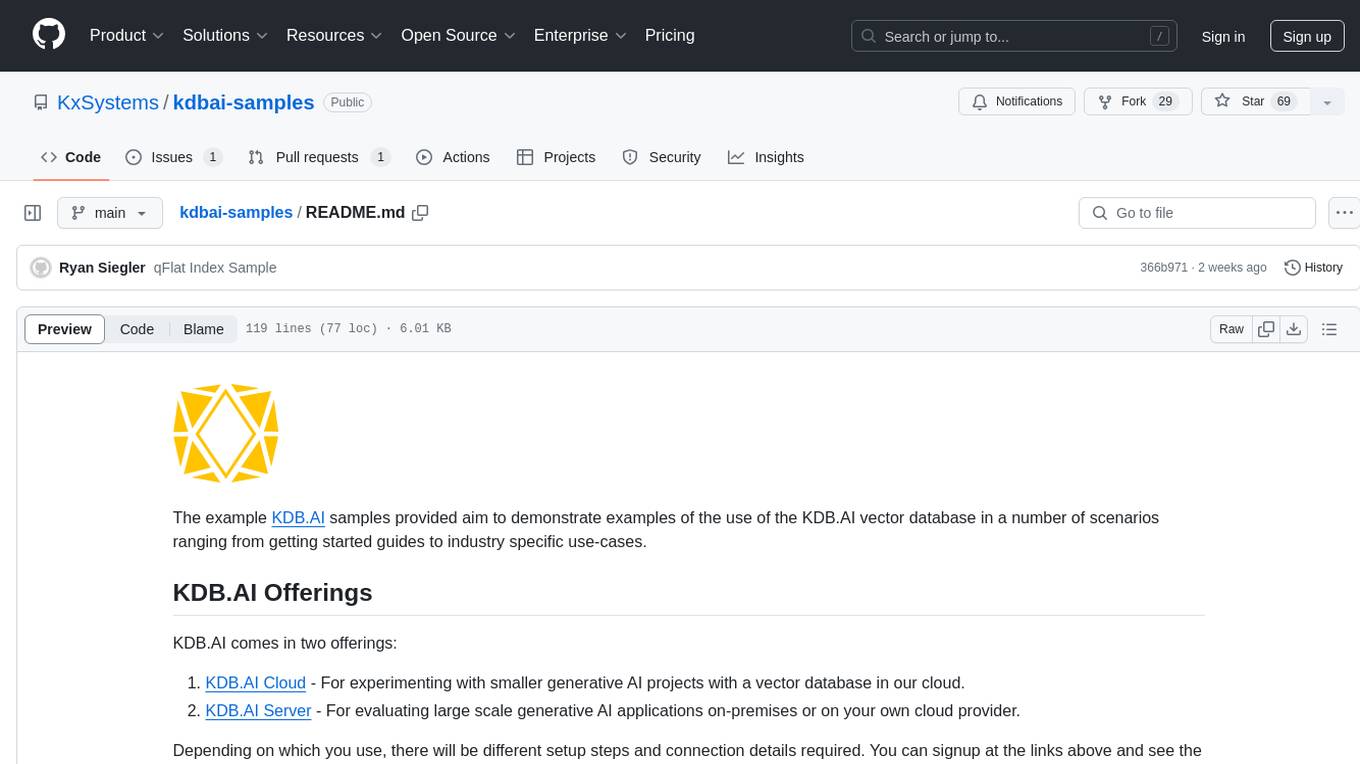
kdbai-samples
KDB.AI is a time-based vector database that allows developers to build scalable, reliable, and real-time applications by providing advanced search, recommendation, and personalization for Generative AI applications. It supports multiple index types, distance metrics, top-N and metadata filtered retrieval, as well as Python and REST interfaces. The repository contains samples demonstrating various use-cases such as temporal similarity search, document search, image search, recommendation systems, sentiment analysis, and more. KDB.AI integrates with platforms like ChatGPT, Langchain, and LlamaIndex. The setup steps require Unix terminal, Python 3.8+, and pip installed. Users can install necessary Python packages and run Jupyter notebooks to interact with the samples.
